Admin
I lost my sight in 2020 – DJ Jimmy Jatt
Nigerian disc jockey, Oluwaforijimi Amu, aka DJ Jimmy Jatt, has opened up about his medical battles and eventual kidney transplant.
Recall that the ‘Stylee’ crooner revealed in 2022 that he underwent a successful kidney transplant.
Speaking in a recent episode of Channels TV programme, ‘Rubbin Minds’ with Ebuka, Jatt said he lost his sight in 2020 and was later diagnosed with chronic kidney disease after undergoing surgery to regain his sight.
He said his health challenges began when he decided to explore the world after living most of his life in Nigeria.
He said, “Maybe I caused it for myself because in 2019 I said that I wanted to spend more time out of the country. I’ve lived all my life in Nigeria, especially Lagos. So I wanted to explore the world; Europe, America, everywhere.
“But in 2020, I started having some health issues. There were travel restrictions at that time so I was just within Nigeria. I lost my sight. I had a surgery and I regained my sight. After that I felt that I needed to take a break and comply with my plan of living elsewhere for a while. Then I relocated to the U.S. When I was in the U.S, I was also diagnosed with chronic kidney disease. I was there for a while. I was on dialysis. Eventually, I came back to Nigeria and had a kidney transplant. After the transplant, I decided to be quiet for a while to recover properly. So immediately I was discharged, I left Nigeria again.
“While I was away, I was still Djying in America and Europe but I decided that it was time to return to Nigeria so I came back in December.”
DJ Jimmy Jatt said lifestyle is not always the cause of kidney ailment, stressing that he has never smoked and has long stopped drinking alcohol.
He revealed that his kidney ailment was caused by diabetes.
[DailyPost]
Yul Edochie plans to name next son after Donald Trump
Controversial actor Yul Edochie has announced plans to name his next son after Donald Trump, the US President-elect.
In a recent Instagram post, Yul Edochie shared a photo of Donald Trump, praising him as the “leader of the Stubborn Boys Association.”
The actor, who is known for his admiration for Donald Trump, expressed love for the President-elect and announced his plan to name his future son Trump.
“Official portrait of my man for life, the incoming president of America. Leader of the Stubborn Boys association. President Donald Trump. You already know I’m naming my next son TRUMP,” he wrote.
[TheNation]
[OPINION] Islam: Beyond terrorism and Boko Haram - Lasisi Olagunju
The United Arab Emirates has just held its Abu Dhabi Sustainability Week. Our president was there. A part of that event was the World Future Energy Summit which ended on Thursday last week. Saudi Arabia is holding a Smart City and Infrastructure Expo in September this year. It held one last year. When Muslim countries do things as these, they advertise Islam in the very best form. They make Islam attractive and beautiful.
Like Saudi Arabia, we have Islam here in abundance but we lack the sanity and prosperity of Saudi Arabia. Like the Western World, we have Christianity but the technological fruit of that faith eludes us. Saudi Arabia is busy building smart cities. It is working on NEOM, a $1.5 trillion digital city that is designed to make Dubai an ancient experience. The name NEOM is a blend of the Greek ‘neo’ (new) and the ‘M’ in the Arabic ‘Mustaqbal’ (future). The anglicized NEOM means ‘New Future’. The name tells the fecundity of the minds that conceived the idea. Saudi is building another wonder called Riyadh Smart City; and a third one christened Jedda Economic City. All these are being programmed to run on the most modern of science and tech ideas. To them, book is not haram; it is tonic that gives life. While they talk of Internet of Things (IoT) and Artificial Intelligence; we loot and burn libraries here; we break bones over who becomes an oba or an emir and who should not – in a democratic republic.
Saudi Arabia and the UAE are monarchies, yet they are modern in ways that challenge and shame our democracy. The Arabs use religion to make for themselves everything that makes the future a better experience than what today offers. Here in Nigeria, we pray for miracles. Life expectancy “refers to the number of years a person can expect to live.” The Vatican City has been the Centre of Christianity since the 4th century. Life expectancy in that city in 2024 was 84.16 years; in Saudi Arabia, it was 75.83 years; in UAE, it was 78.60. There is another Arab country called Qatar; life expectancy there in 2024 was 80.88 years. Like the Vatican City, Nigeria has Christianity in great abundance, just as it has a surplus of Islam like the Arab countries; yet, the number of years a person could expect to live in Nigeria in 2024 did not exceed 62.2 years.
Our president was at the UAE event. He must have seen the Muslim Arab country using 21st century brains to power its leap into the future. The rich who rode Rolls Royce there last year still ride their wonder on wheels. There are no fears of a government policy that will reduce them to jalopy drivers this year. The state won’t also fleece the poor to feed the rich. That country and others in its league leverage the best in technology to create hubs of innovative solutions to existential issues. Saudi streets are clean; its people are happy and resourceful. Yet, it is not a democracy and has no plan to be one. The UAE has the iconic Dubai as its poster of excellence. The country does not waste its time voting the worst to rule the best. Both countries are Islamic countries, but they do not breed Almajirai, Boko Haram and other variants of extremism that make lepers of their region and religion.
We cannot become those countries until we have blind laws that recognize no class, no ethnicity. We need schools, not temples of miracles. Saudi is a praying nation like us. Unlike us, Saudi Arabia does not insult God with laid-back demands. Saudi Arabia’s top universities are world class. Check their ranking; check ours. Everything that makes a nation fail itself is here. What we have here can only breed enlightened ignorance and unremitting want.
Saudi Arabia is attracting the best brains from all over the world to its universities. And the universities are not there as mere salary-paying loss centres. They are at the forefront of the country’s agenda for its emerging quantum revolution. What do we have in Nigeria?
At the last convocation of the Obafemi Awolowo University, Ile Ife, the institution’s pro-chancellor, Professor Siyan Oyeweso, delivered a withering verdict on the state of the Nigerian ivory tower. He said “the Nigerian university system has been replaced with ‘indigenized’ and ‘villagized’ universities. The hitherto national and international character of the system has been replaced with inbreeding. The staff profiles of federal and state universities – academic and non-teaching – reveal a shocking practice of father, mother, brothers, sisters and children working in the same system. Family dynasty has replaced the merit system.” Damn!
I connect very well with what Professor Oyeweso said. As an undergraduate, we had teachers from all over the world. There were foreign students just as children of the rich and the poor shared seats in lecture rooms. My university classroom experience was a lesson in classlessness. I shared the same class with an Akinrinade in an era when General Alani Akinrinade was one of the biggest names in the country. There was a Soyinka in my class. Governor Oladayo Popoola’s law-student daughter offered some courses that I also wrote in the same class. Yet, our Tigris and Euphrates flowed their courses in amity. The class that existed was the class of learning.
Today, when we tell our 1980s stories and the ones our fathers told us of the 1950s and 1960s, they mean very little – or naked nothing, to our children who have had zero positive contact with the Nigerian state. The mix of experience and status we enjoyed is missing today. Decay in public schools has driven the privileged abroad, or to private schools. The height of parents now determines how high the children can fly. Those stuck in public schools are daily plotting their escape. We cannot be well without casting down our castles of decay.
Despite their advancement in everything, the Arab world is still combing the world for more knowledge. Even our unusual country has been a destination for them. A delegation of the Association of Arab Universities was at the Arabic and Islamic Centre, Markaz, Agege, Lagos last week. Reports said they inspected the impressive digital technology and language laboratory, ICT Centre of the school. Why were they here? If you asked them, they would tell you that seeking knowledge anywhere is an obligation in their religion.
The black man wasted all the centuries of the past. We’ve wasted a quarter of the current century. The Renaissance of the 14th century influenced the Reformation of the 16th century. Both were the shock treatment that jolted the West out of its illiteracy and general backwardness. We need local versions of those two experiences to force a change here. We do not have the time.
A tiny country called UAE built adorable Dubai from a desert fishing village. Our president was there. We wait for the fruits of that visit. Saudi Arabia is using the fruits of Islam to build smart cities. We flock there for worship, business and leisure. Countries that emerged from the rubble of imperial Rome used Christianity to build the Western economies that continue to water our world. Here, we are using religion to cheat, to kill and plunder and cause confusion. The science that made Saudi and Dubai possible is sin to some mis-taught people. Our aspiration is not to gain the success of Saudi; we cannot build Dubai; we are far from where the West is, but we love the beauty of those places. Who really are we?
FULL LIST: EFCC to auction 891 ‘forfeited’ cars, names vendors
The Economic and Financial Crimes Commission (EFCC) has announced that it will conduct an electronic auction of 891 cars.
In a notice published on its social media handles, the anti-graft agency said the vehicles have been forfeited in line with the EFCC (Establishment) Act, 2004, Public Procurement Act, 2007 and the Proceeds of Crime (Recovery & Management) Act, 2022.
The agency listed the auctioneers for the sale of the “forfeited” cars. The electronic auction is expected to run from January 20-27.
Interested parties have been directed to the following websites: www.rihogo.com, https://biznjeg.ng, www.areogunresourcesniglid.com.ng.
THE LIST
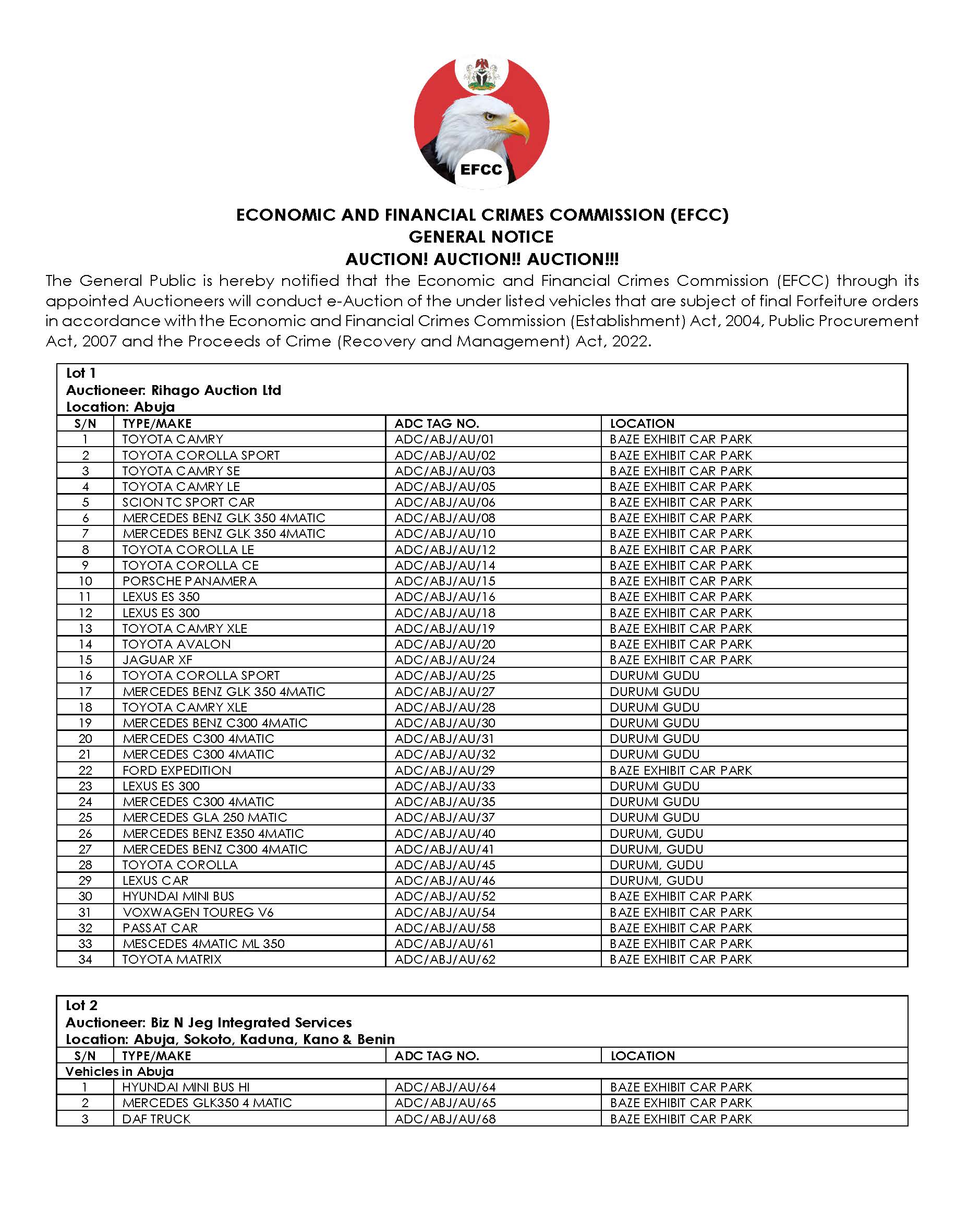
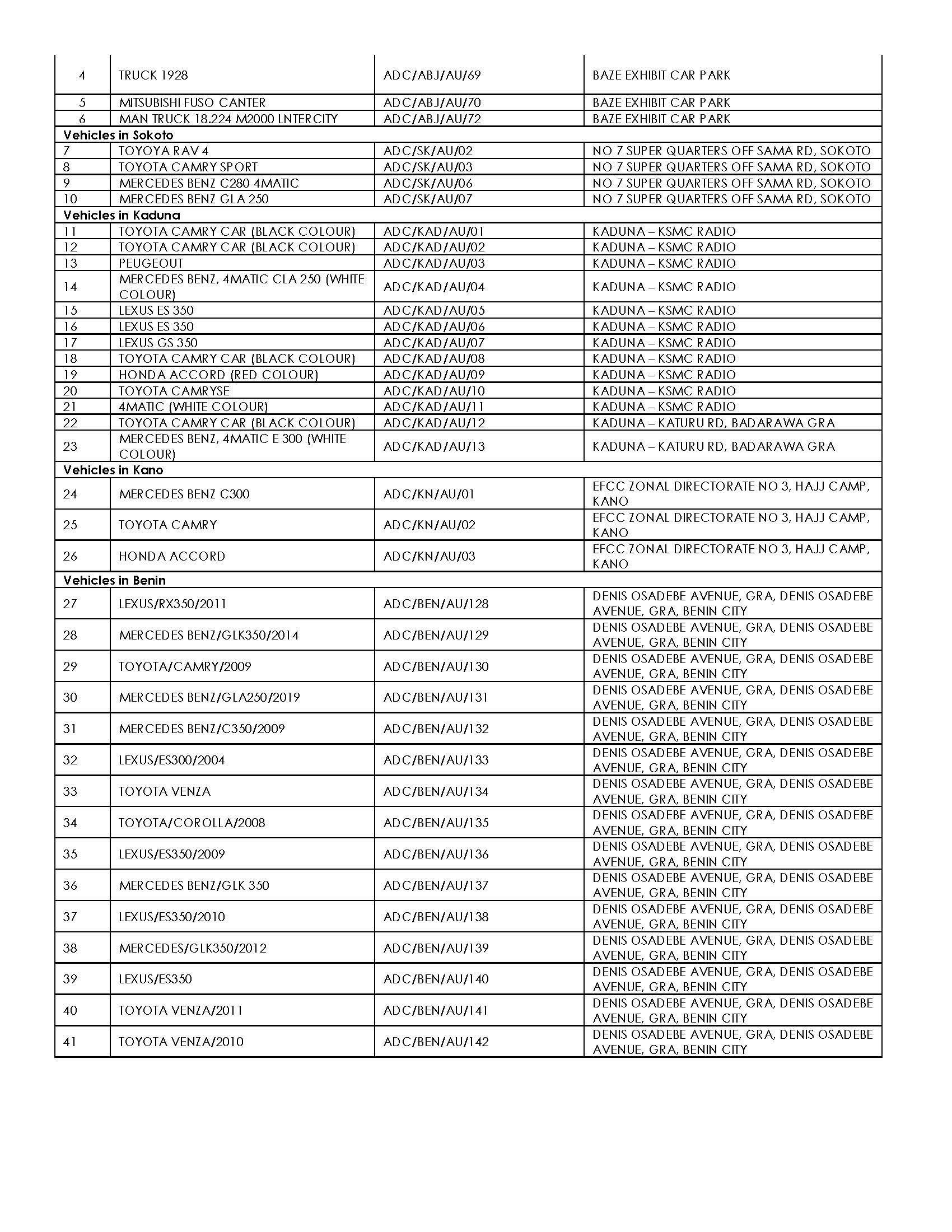
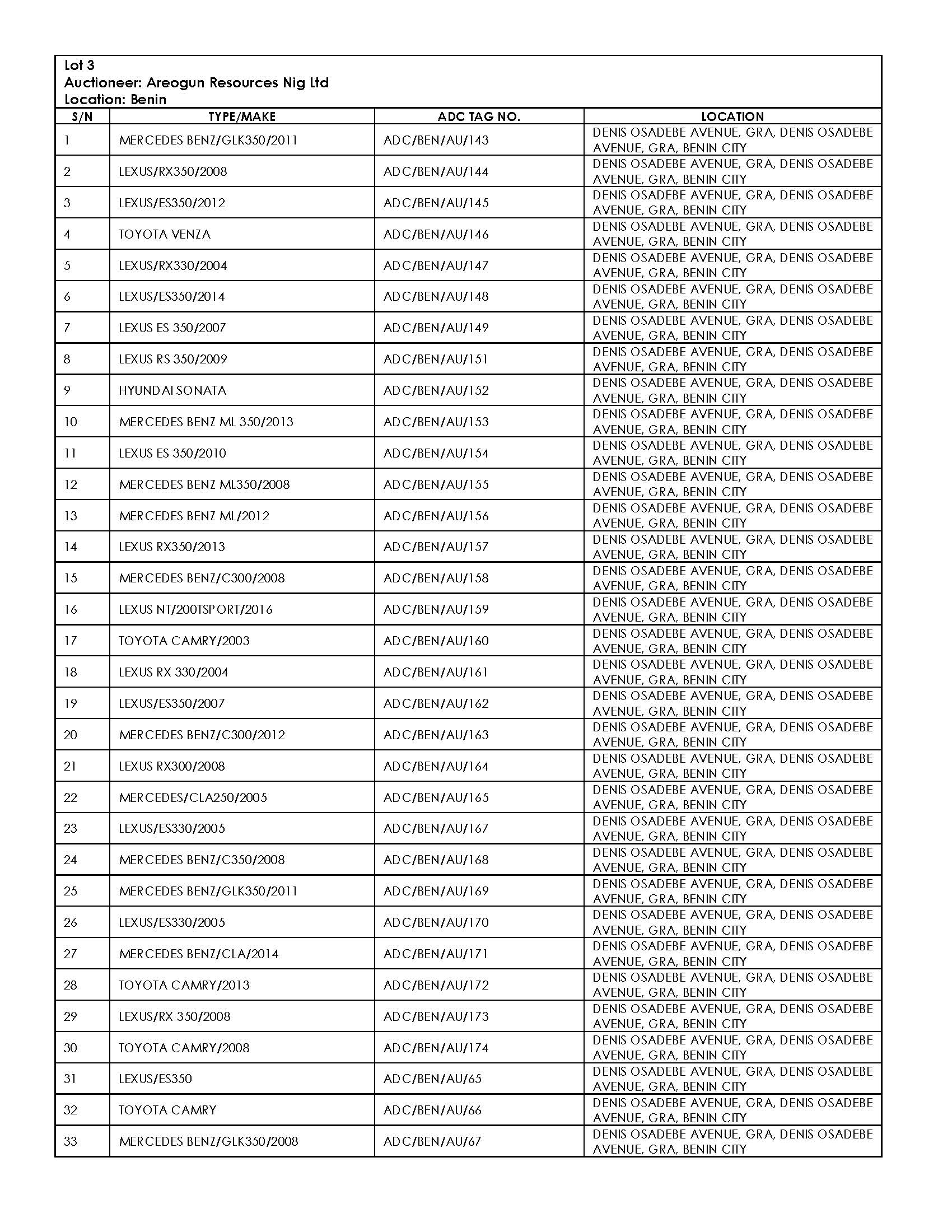
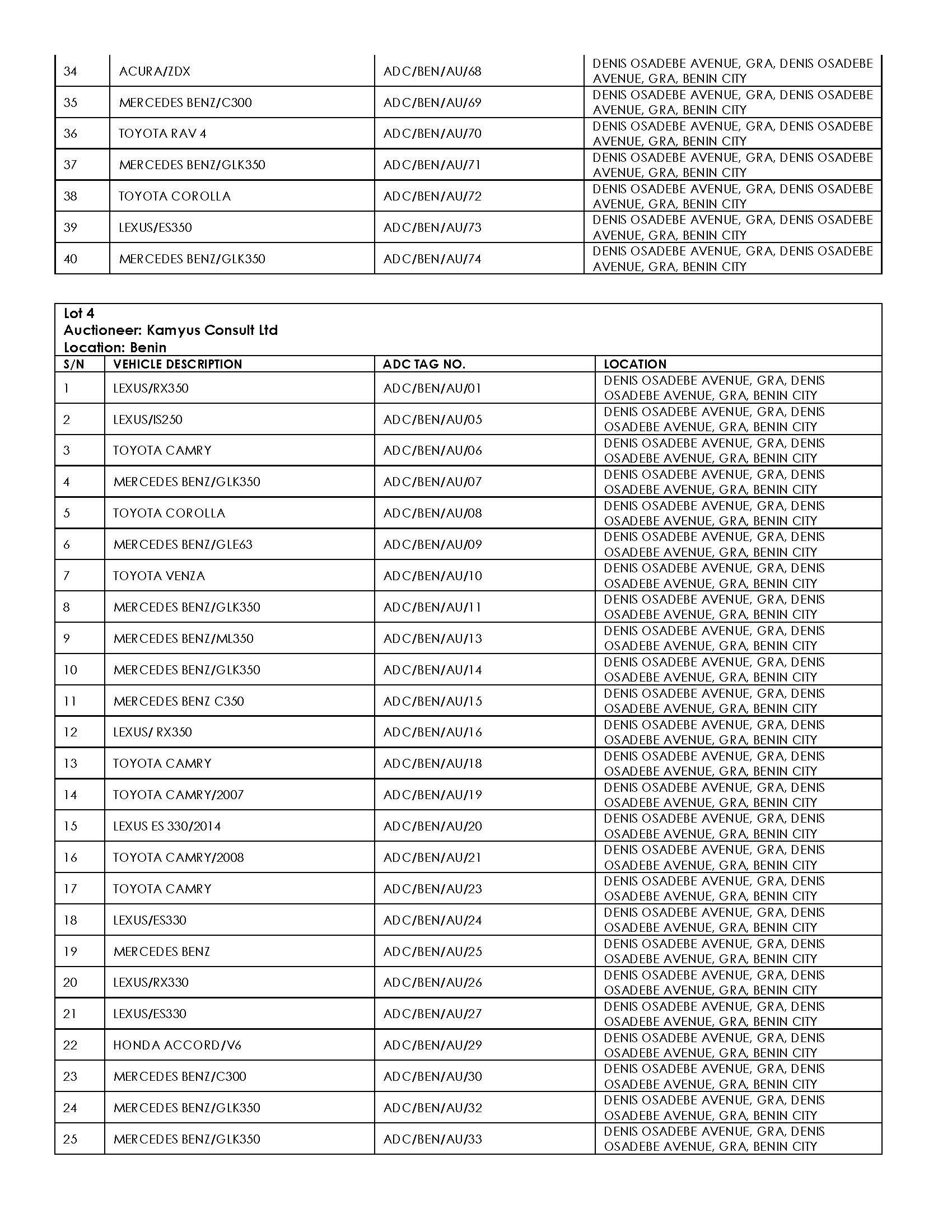
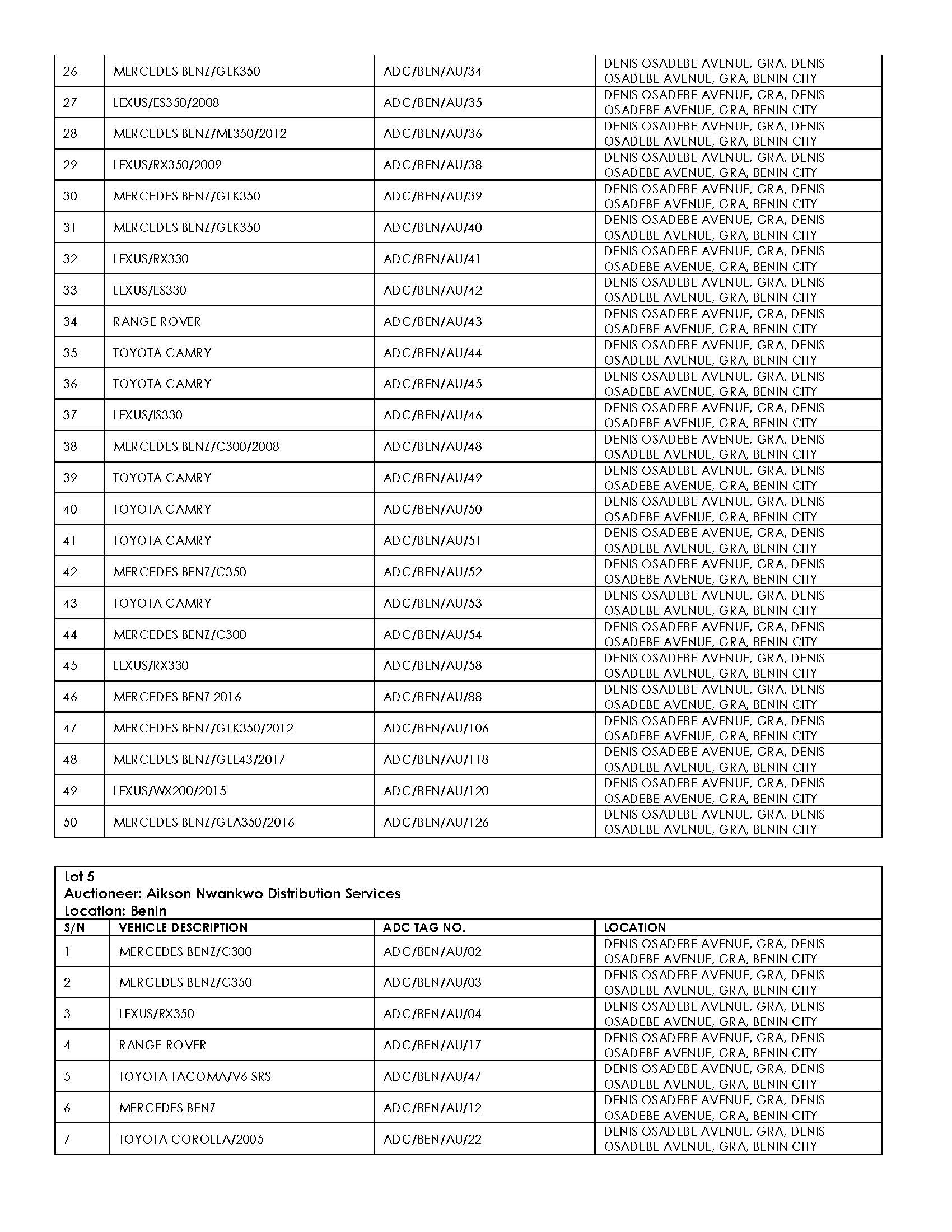
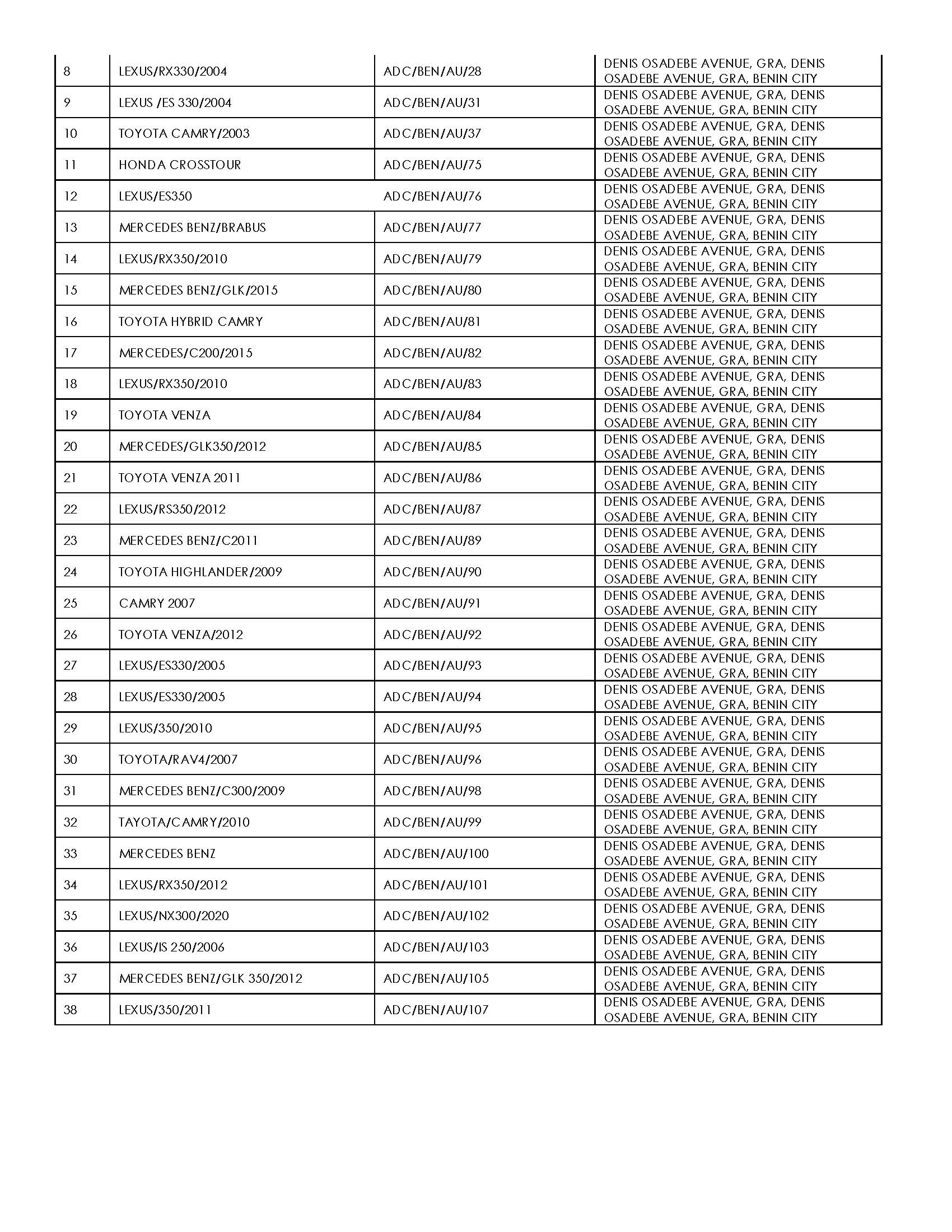
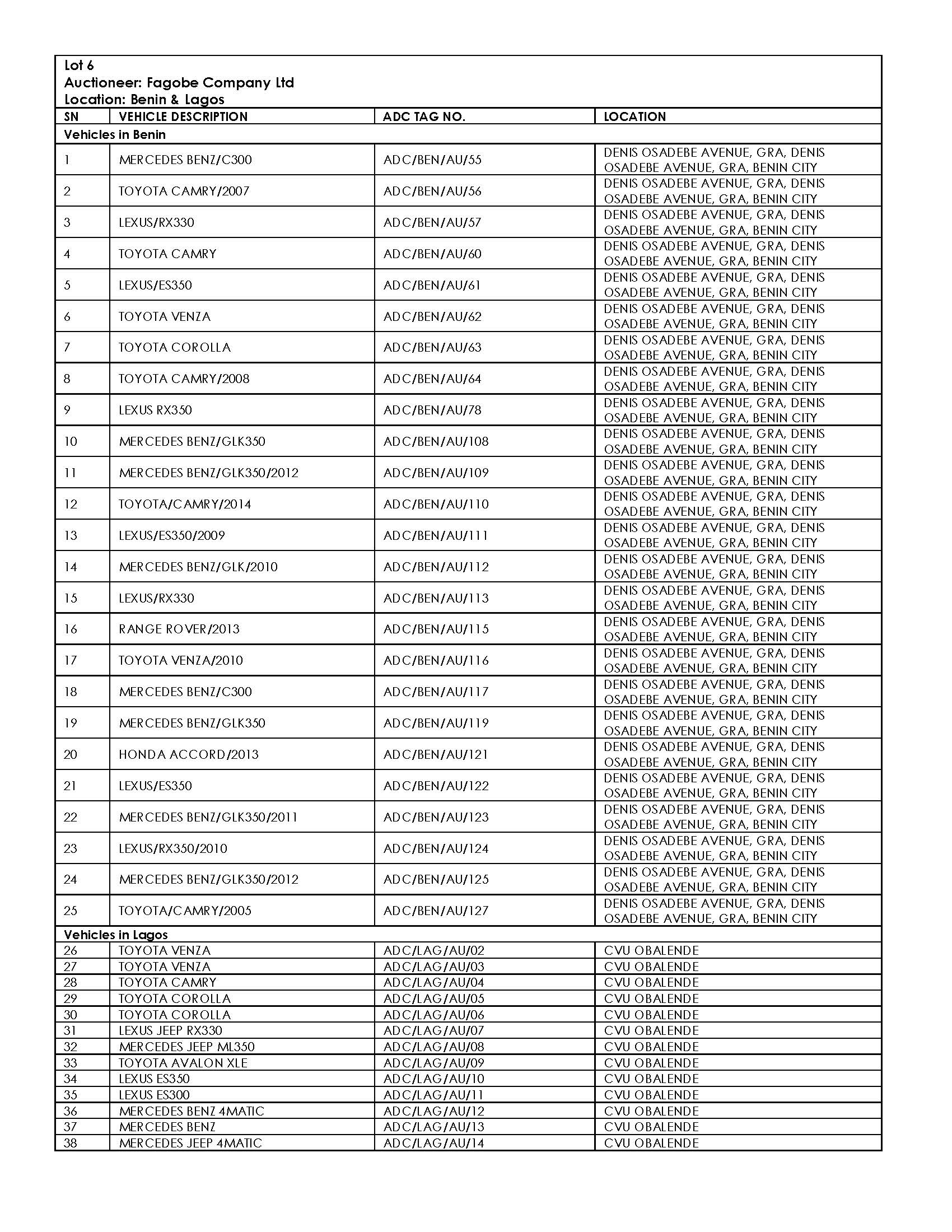
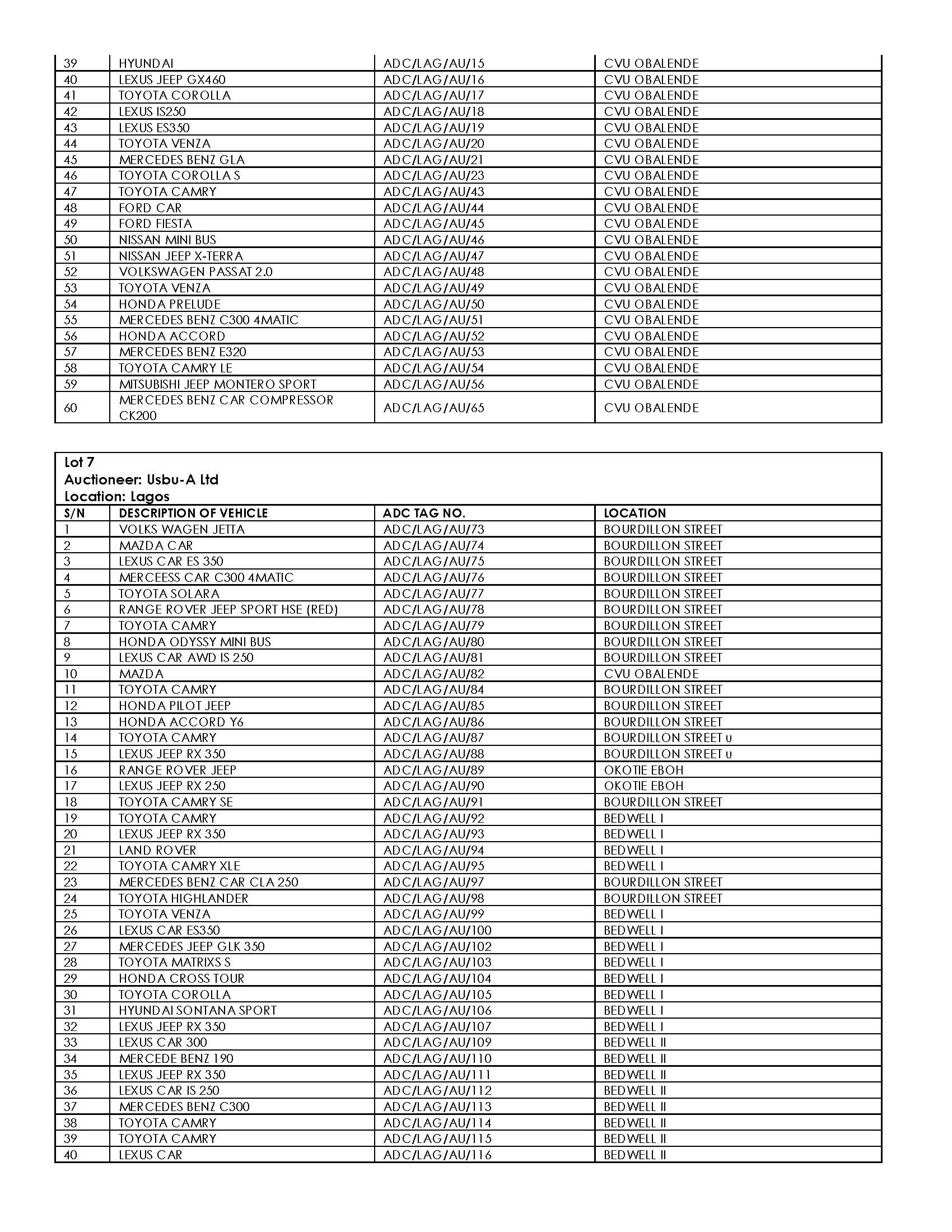
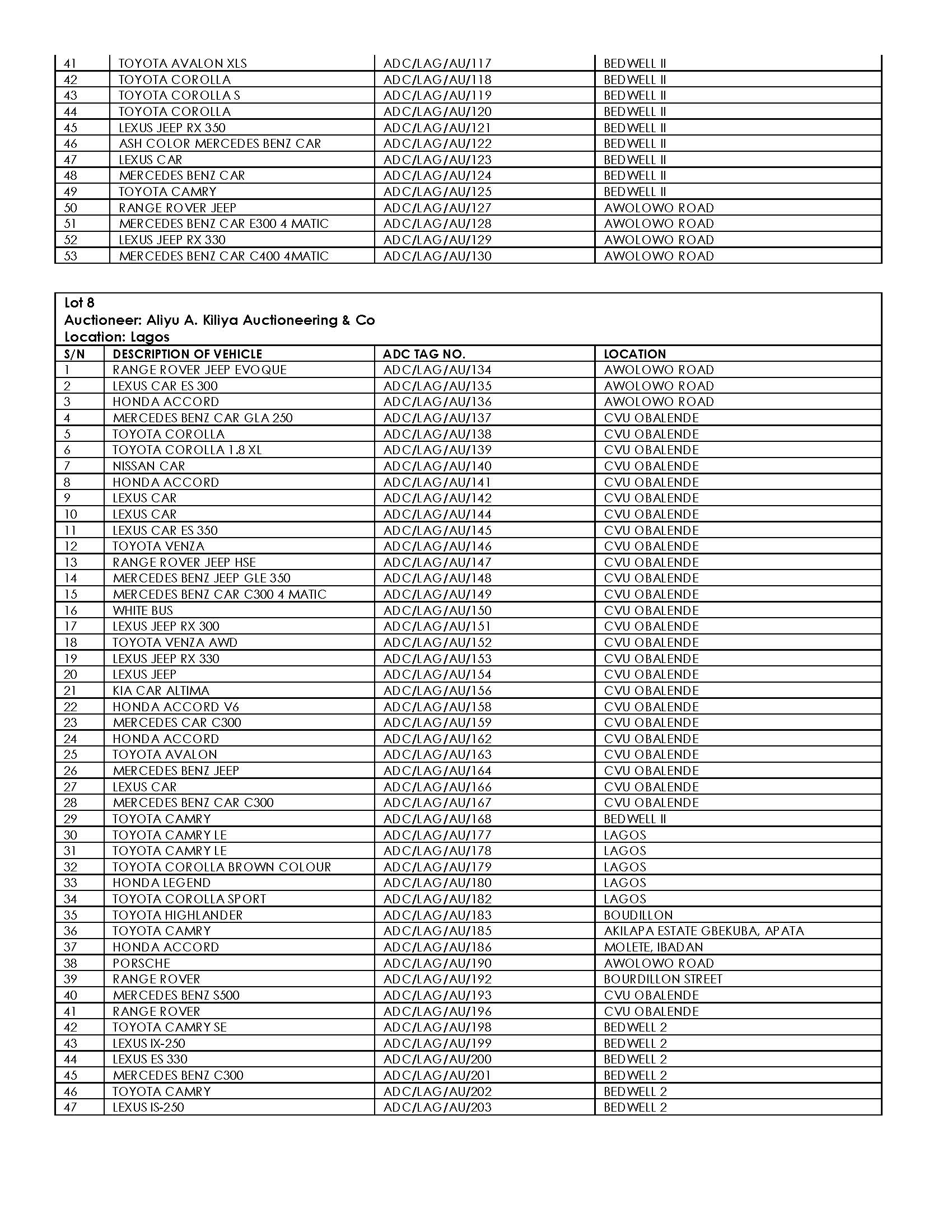
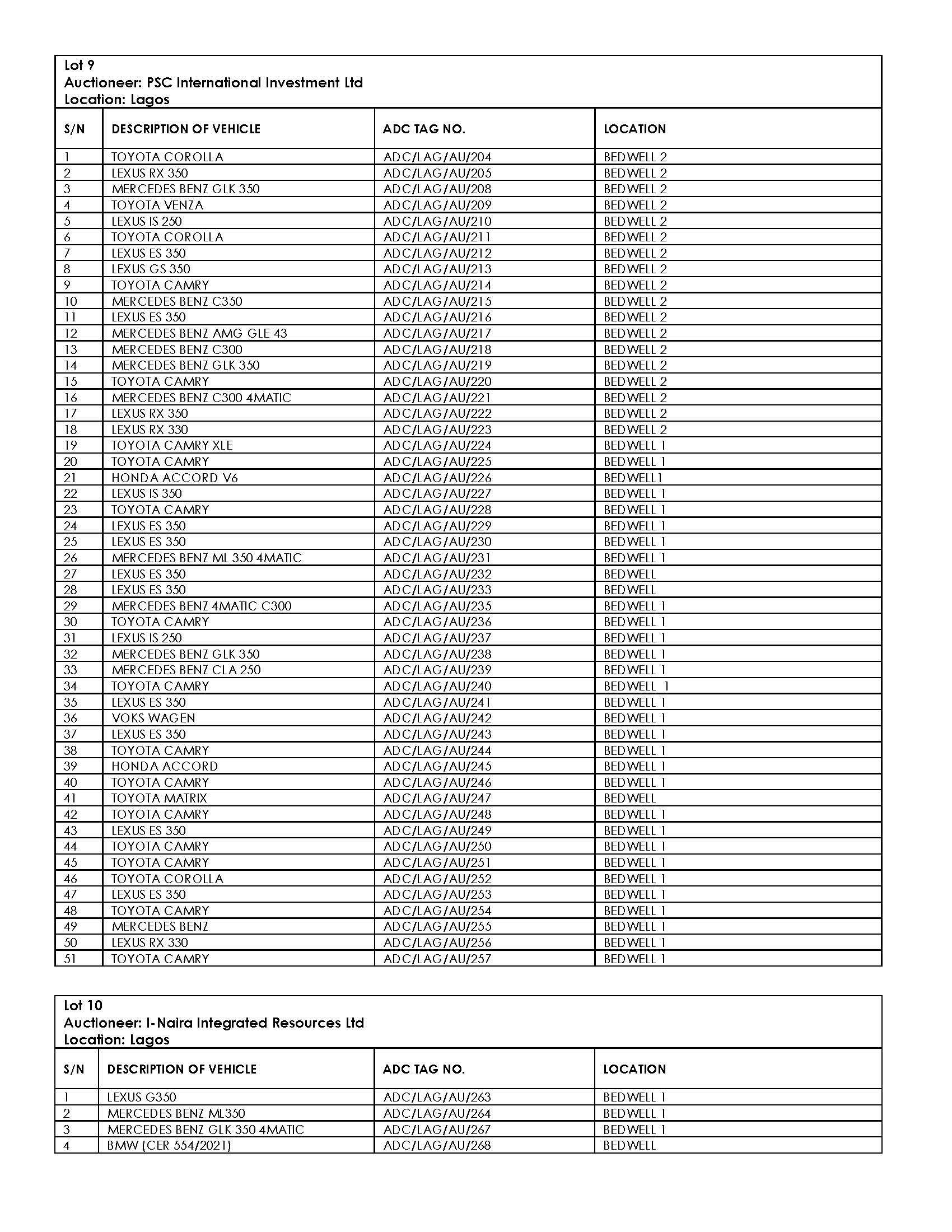
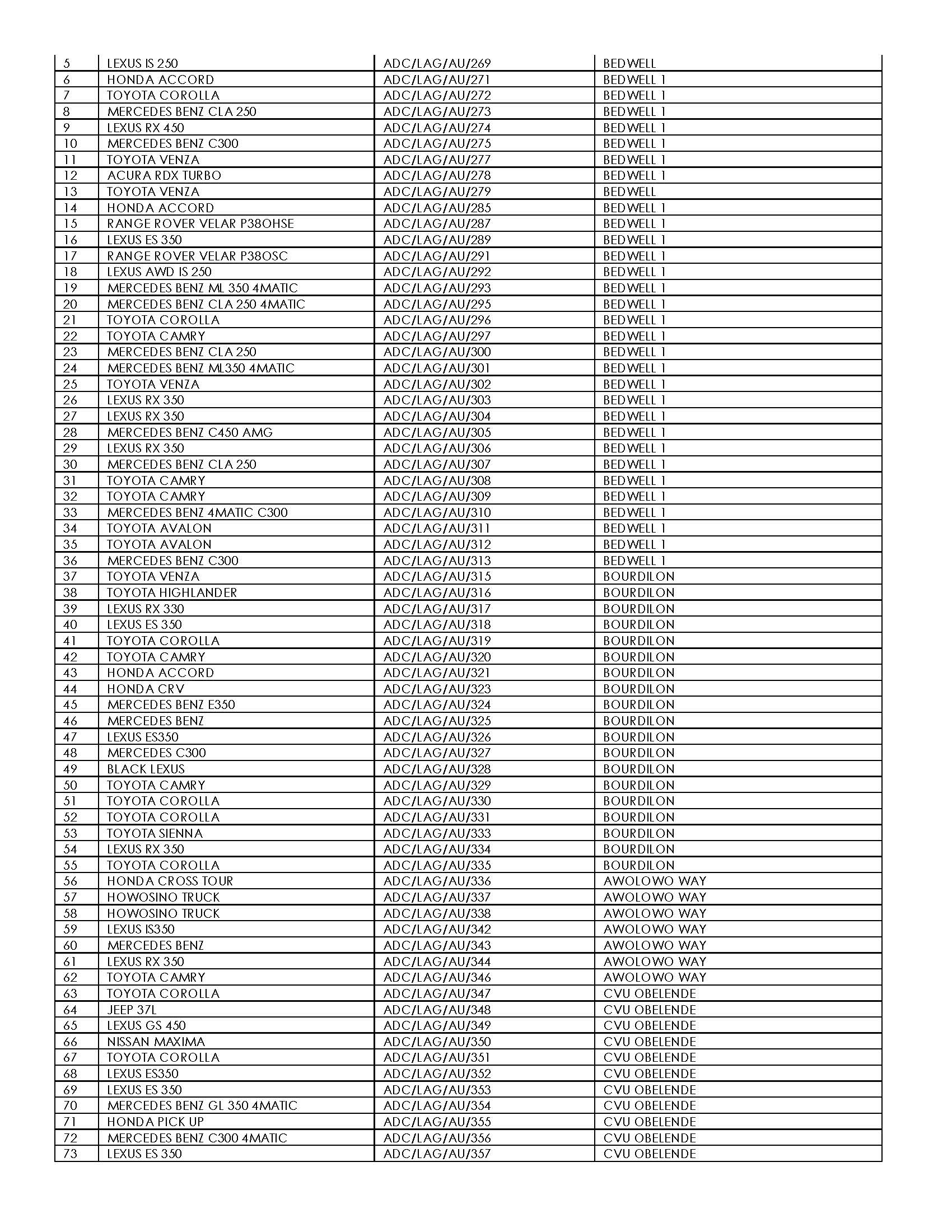
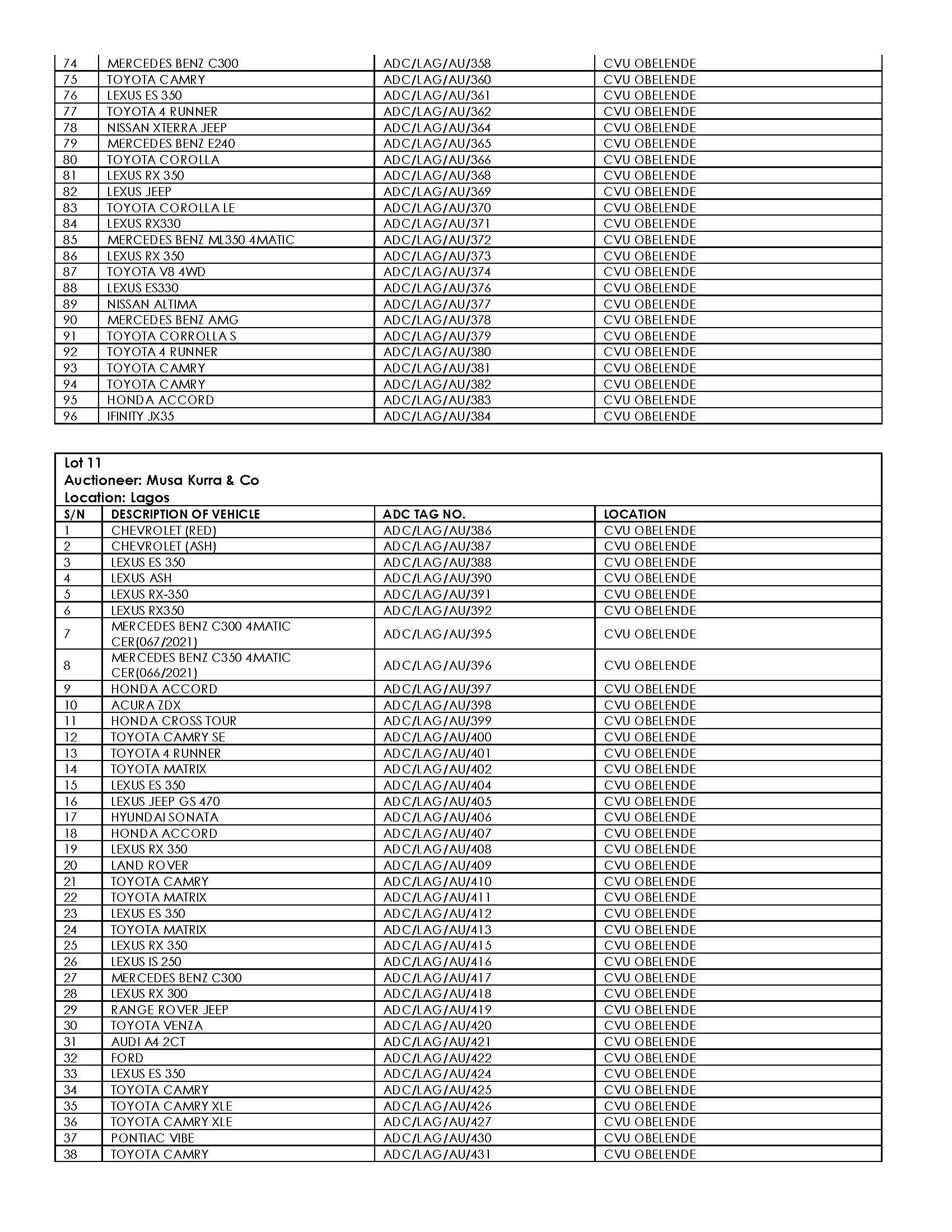
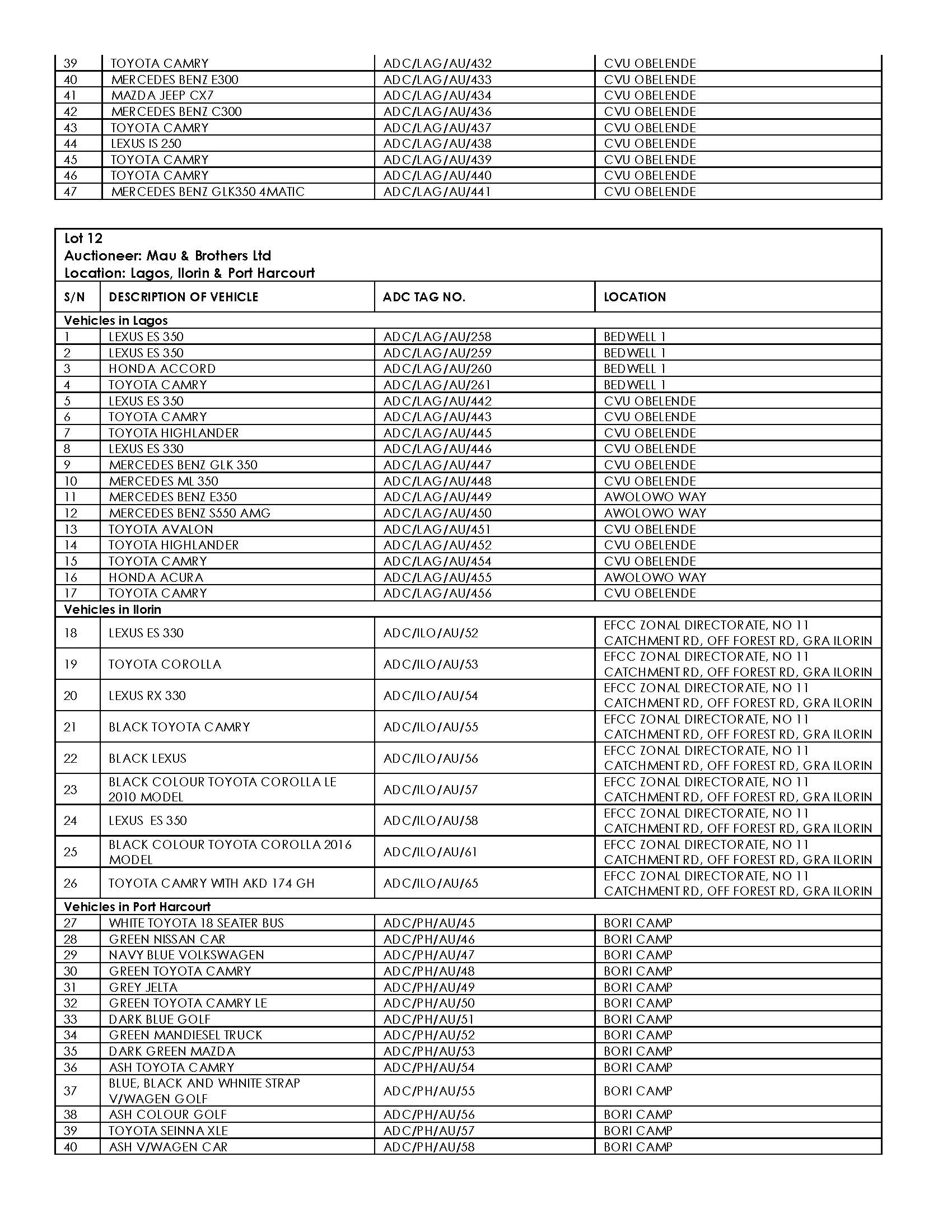
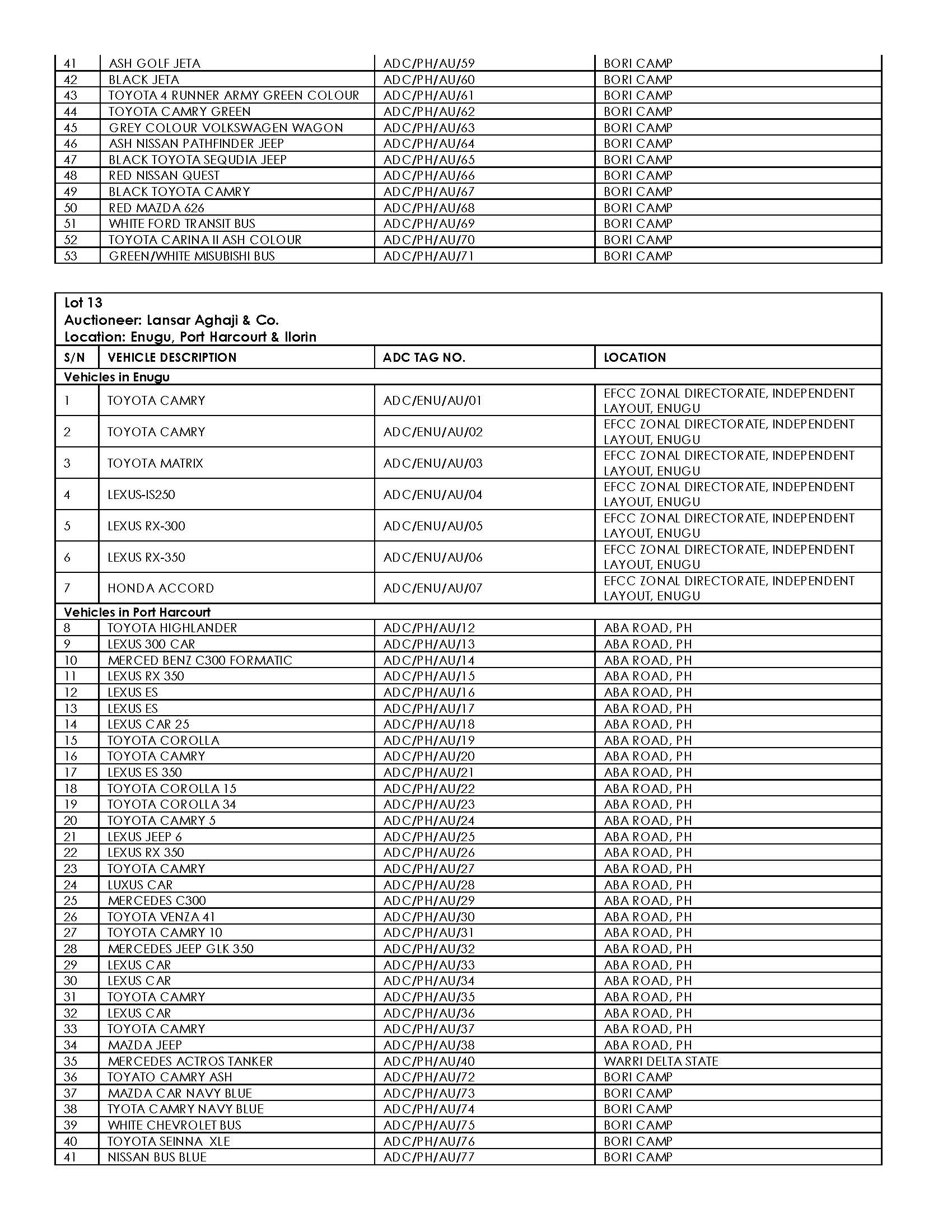
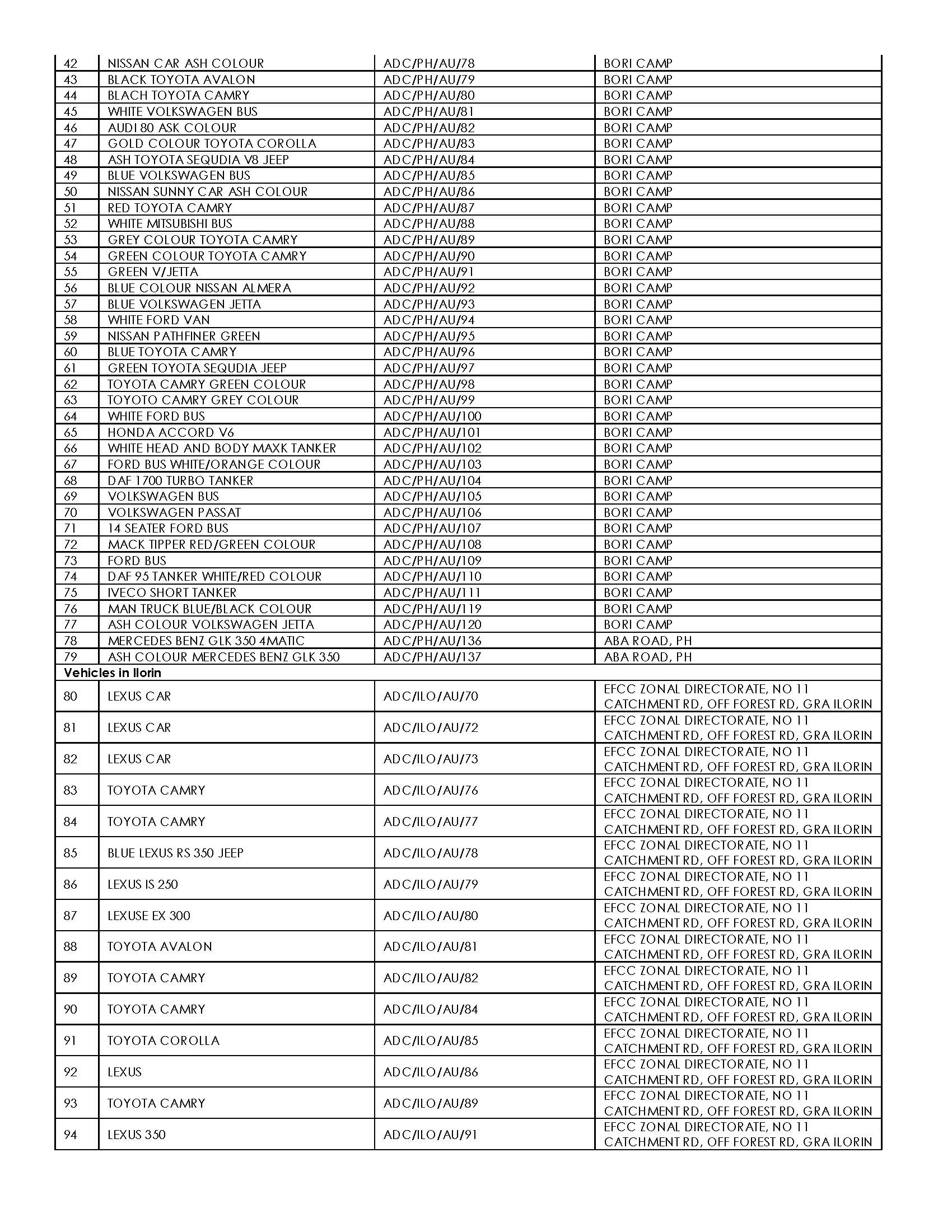
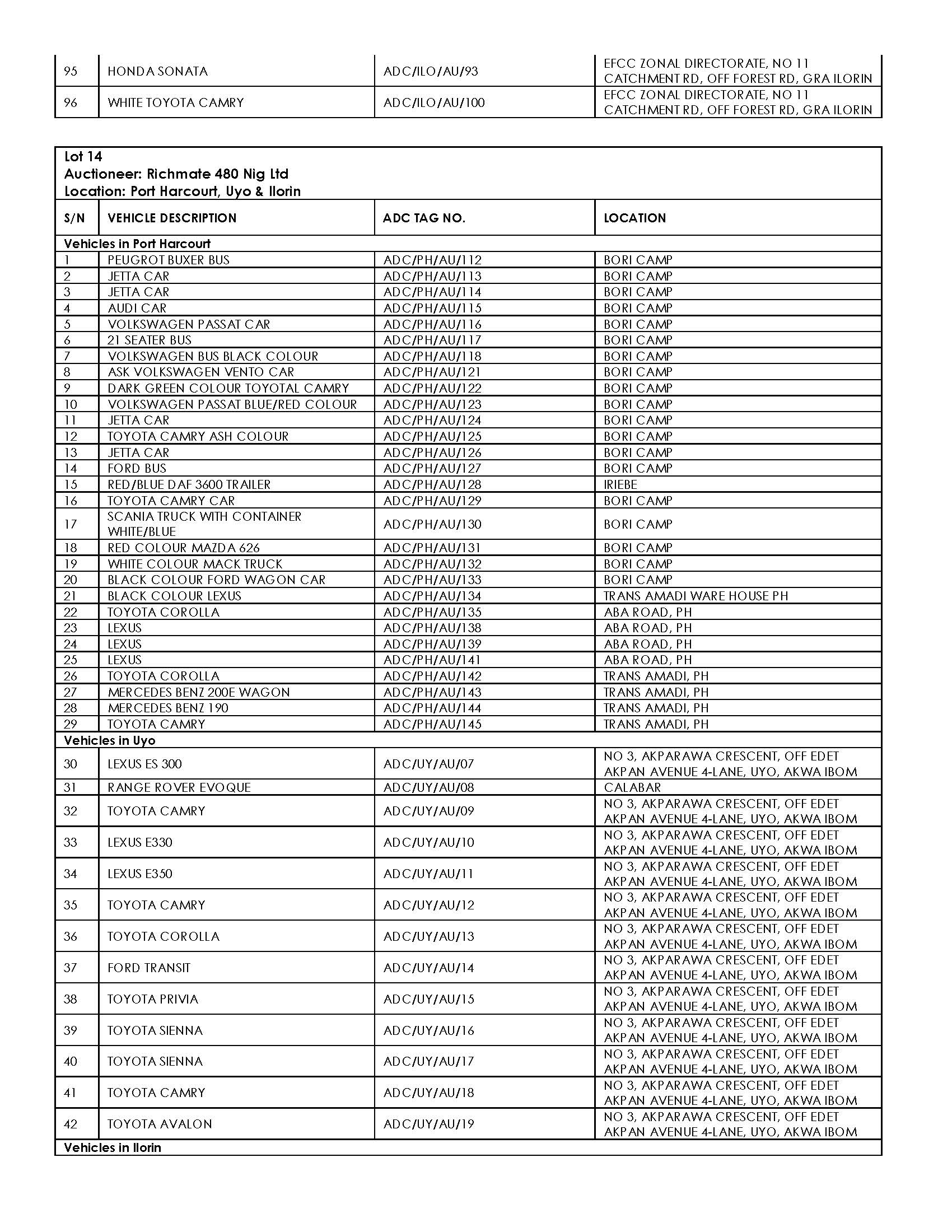
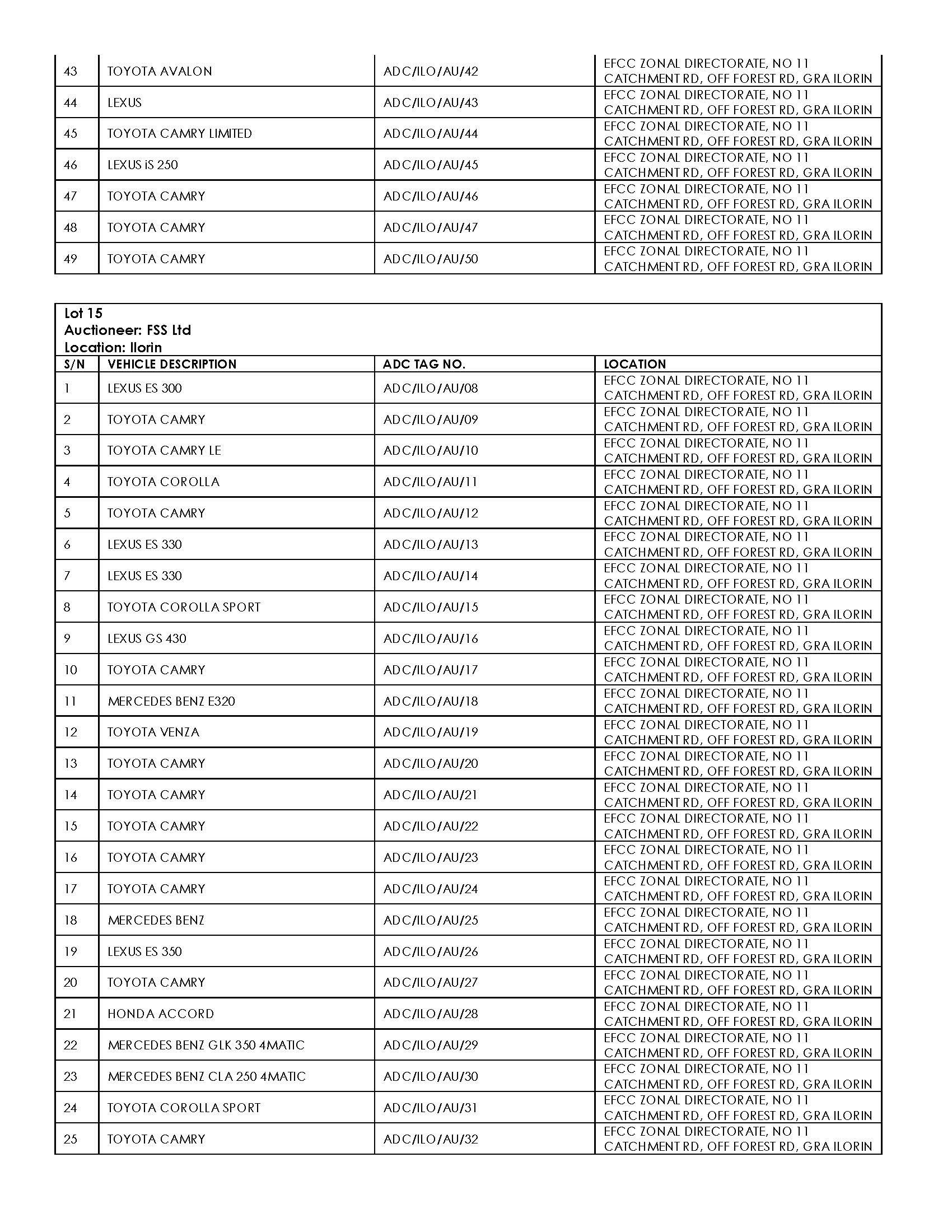
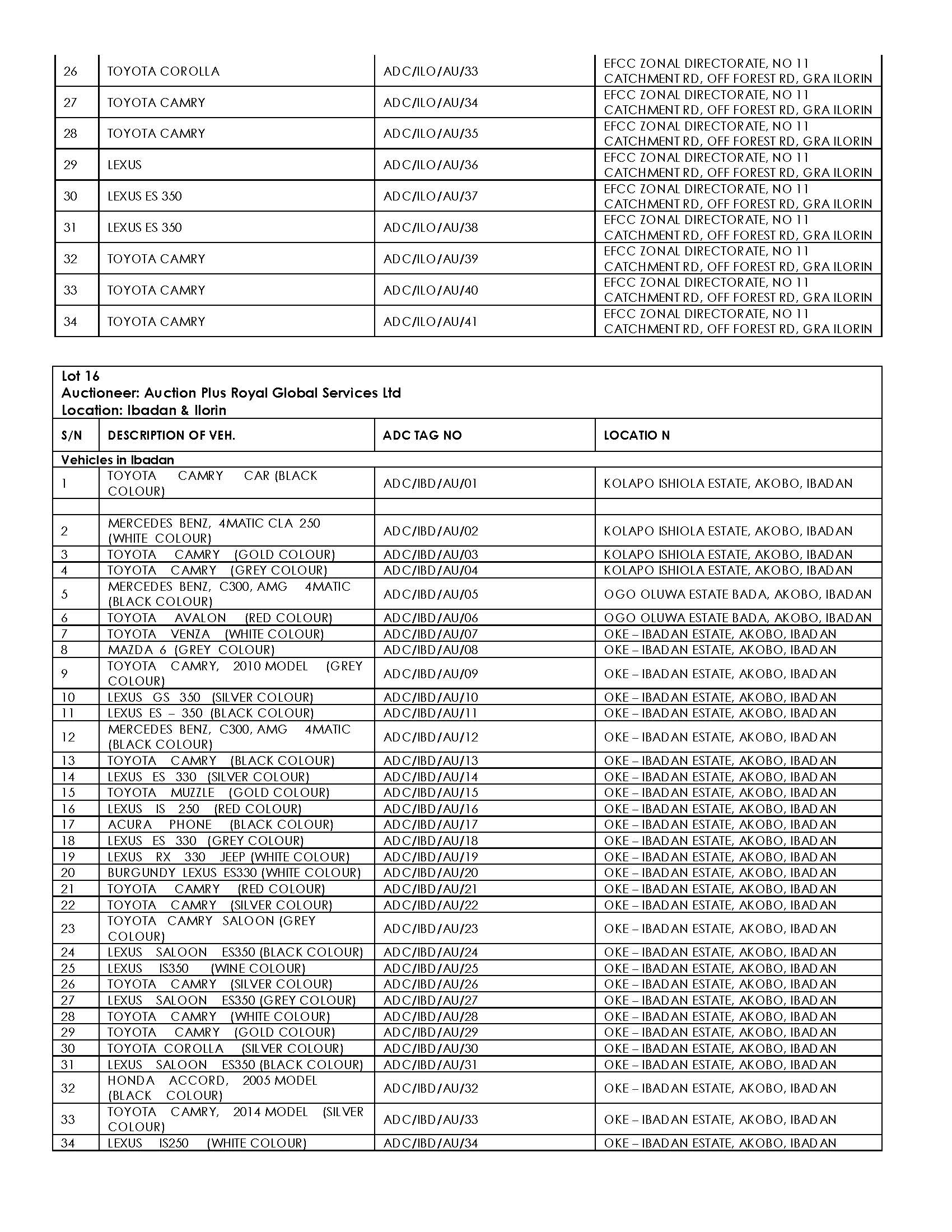
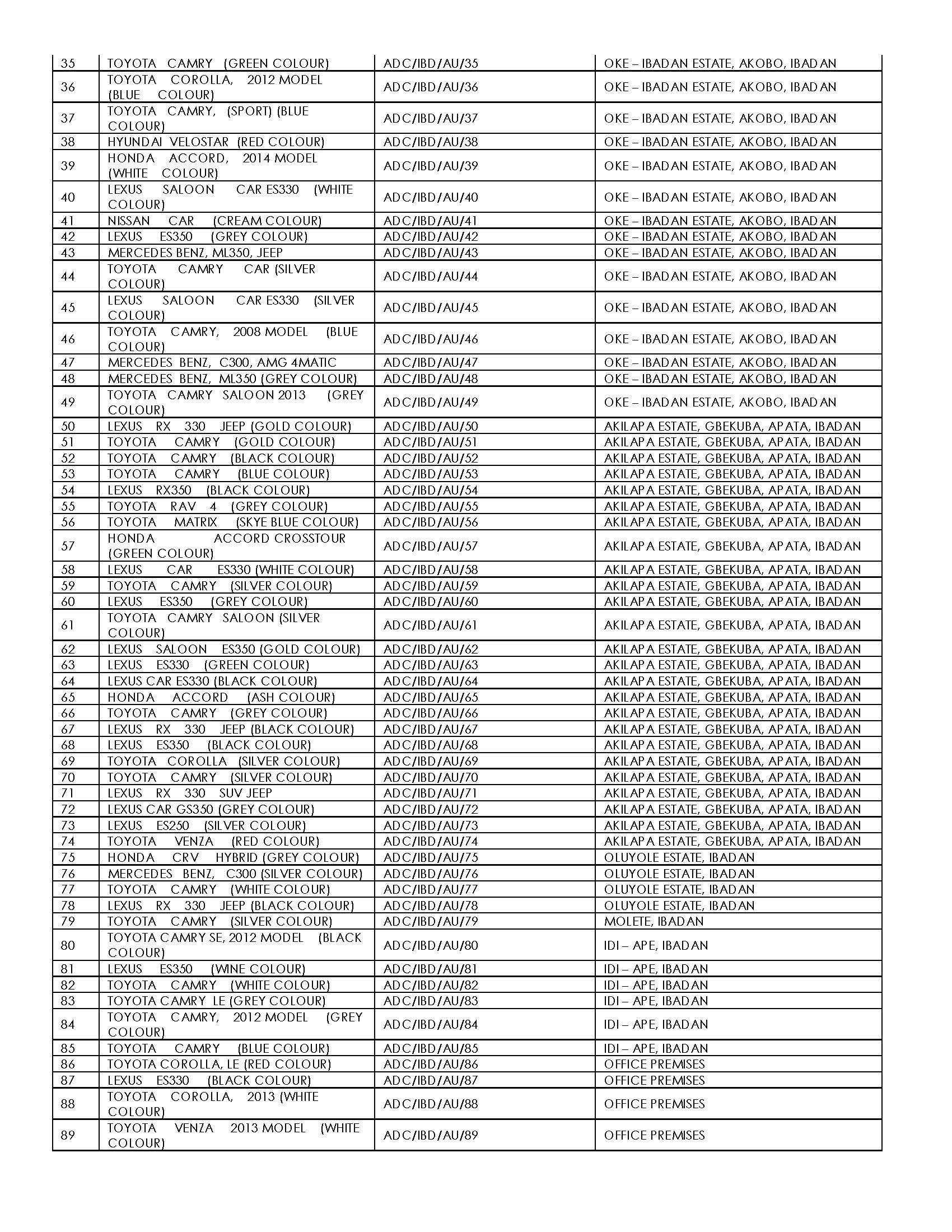
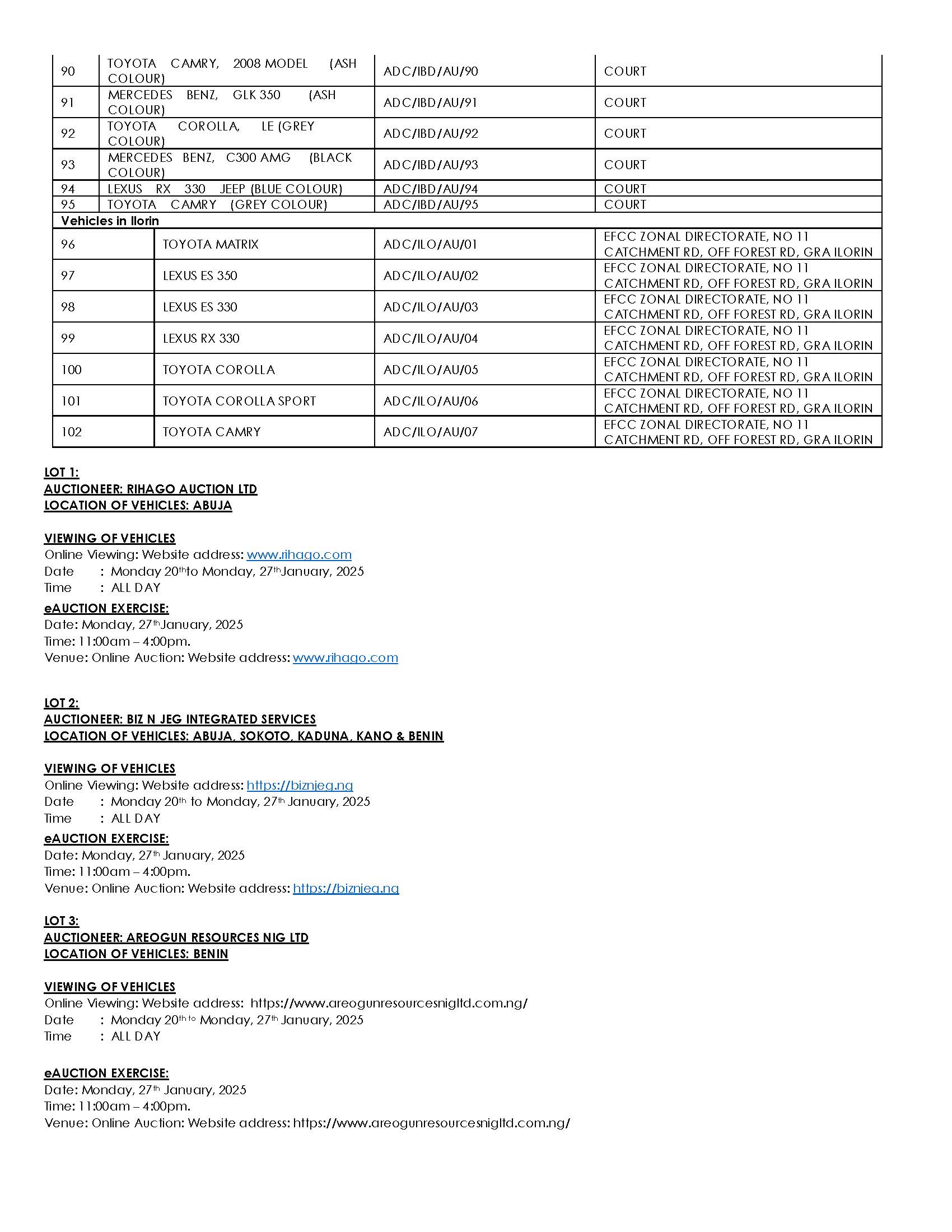
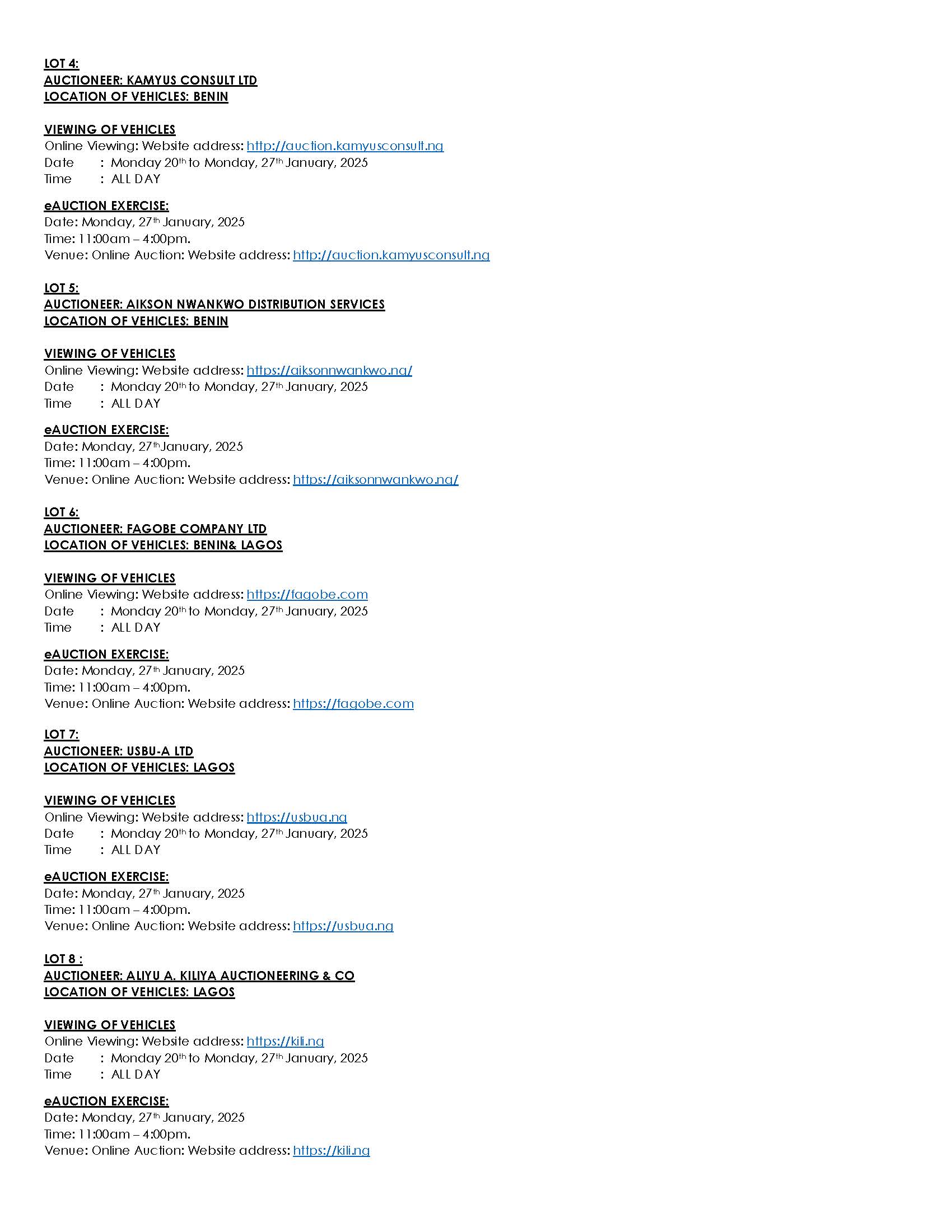
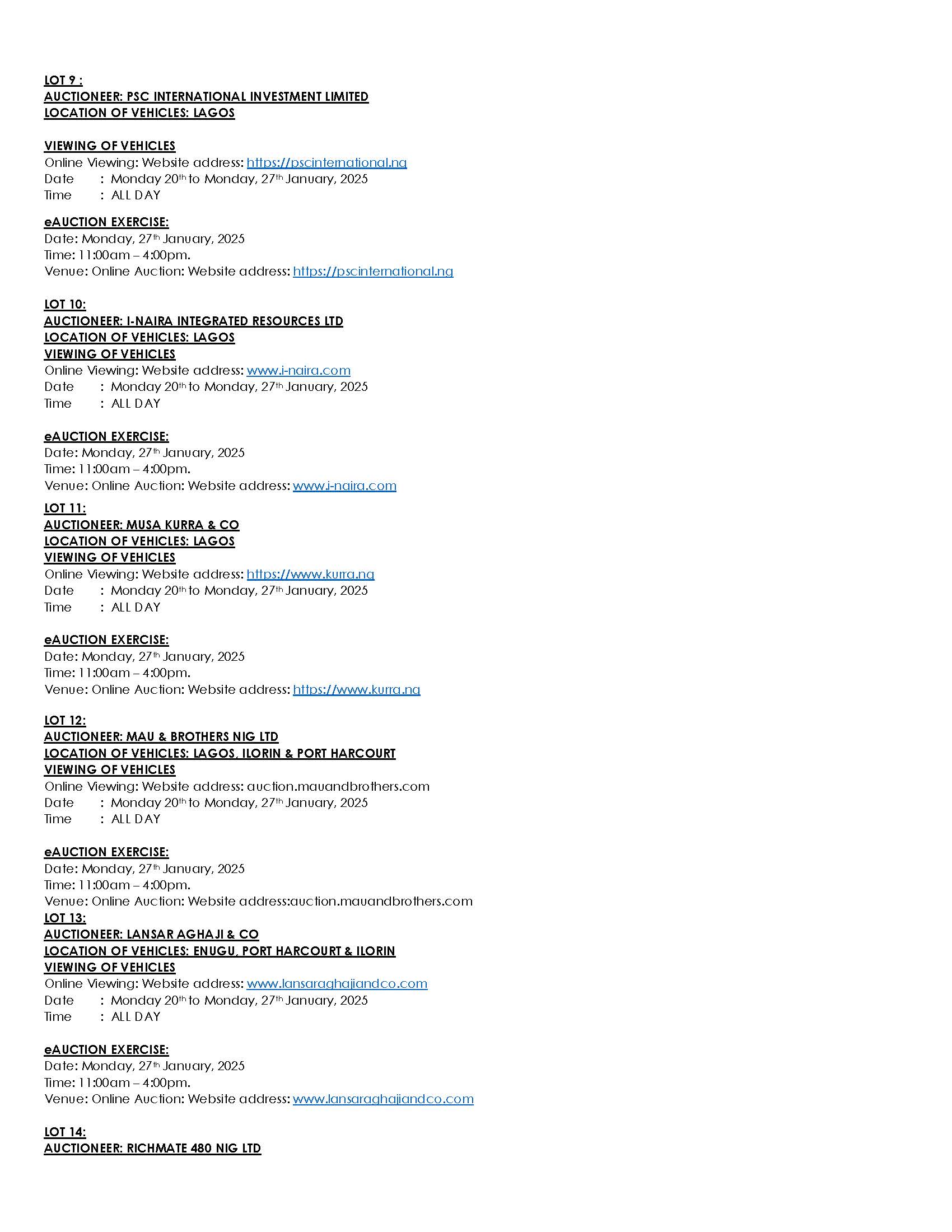
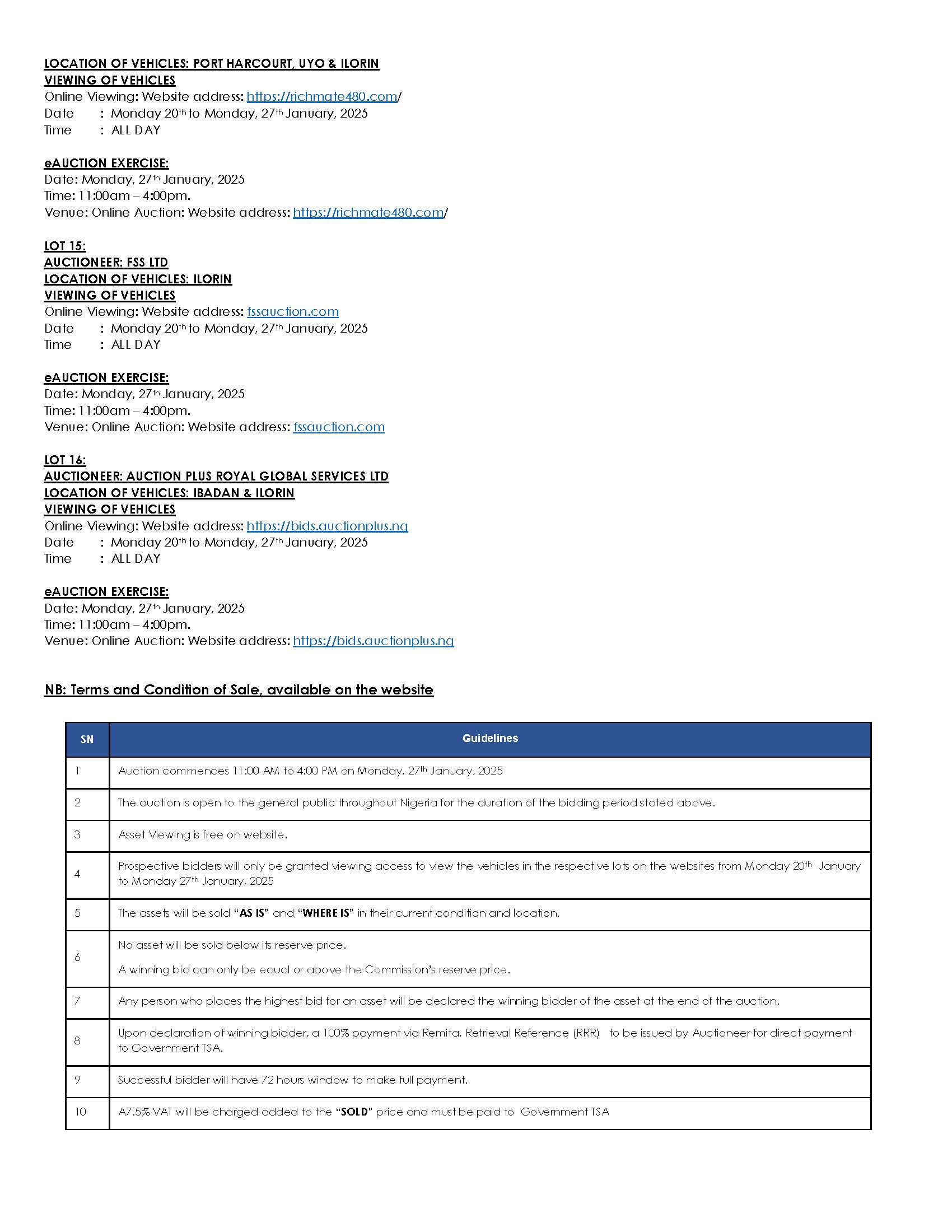
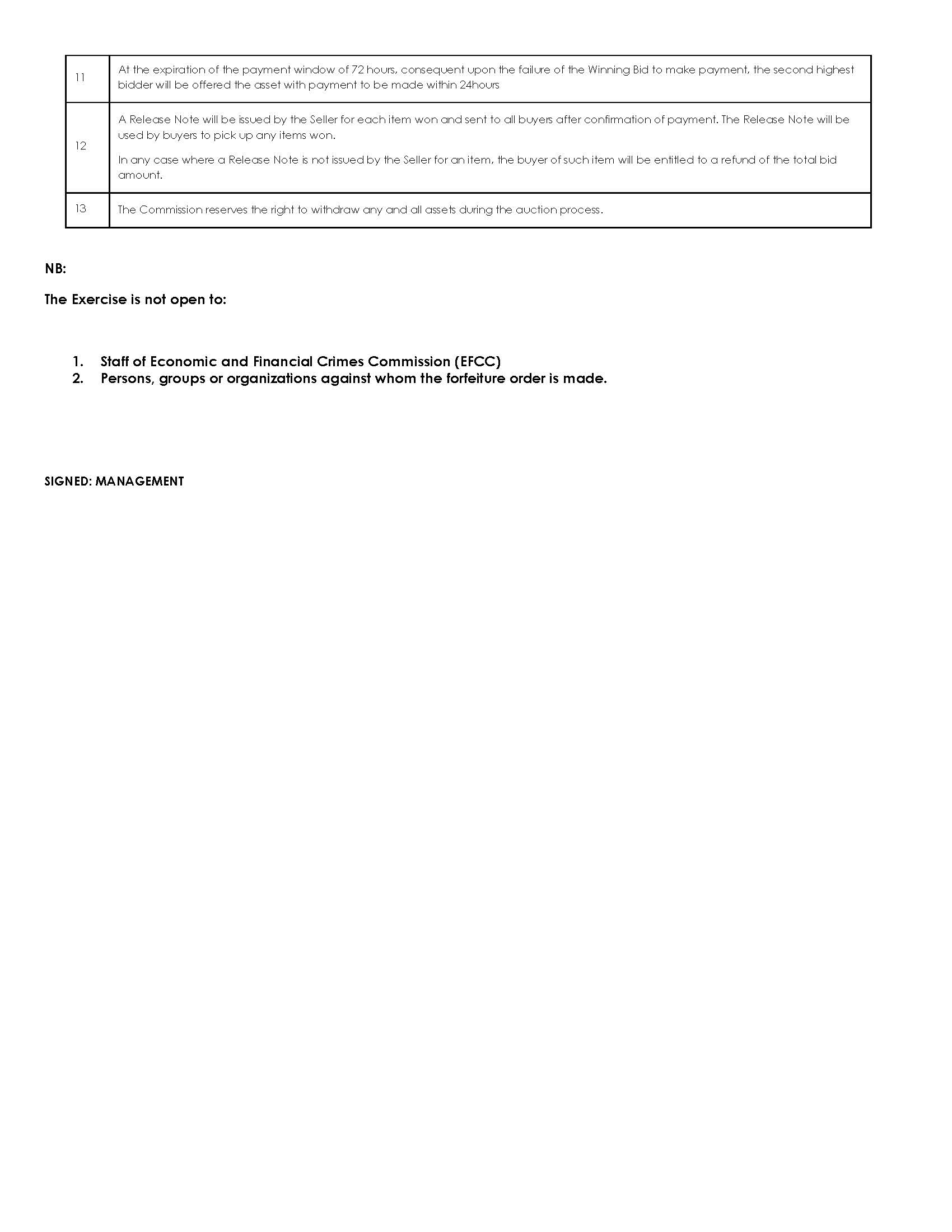
Cardi B confident amidst TikTok ban, flaunts income streams
American rapper Cardi B has said that she wouldn’t be affected by the ban on TikTok in the United States.
PUNCH Online earlier reported that TikTok shut down in the U.S. on January 19 after its Chinese owners failed to sell the platform, as mandated by a law enacted by President Joe Biden in April 2024.
Following the ban, a social media user with the X handle @1lex said rappers, such as Cardi B, who depend on TikTok to promote their music should find alternative jobs.
The user wrote: “Now, all the female TikTok rappers gotta find real jobs. You first, @imcardib.”
Responding, Cardi B said, “Babe, I’m getting a $7 million offer to do my own vitamins. I can retire you from your flipping burger job by tomorrow. Thank me though; I’ve been helping you get your $8.99 Twitter check.
“The ‘you’re successful/blew up bc of TikTok’ narrative doesn’t work on Cardi B, try again.
“Today gotta be the funniest day on twitter is literally killin me… when did y’all get this hilarious???”
[Punch]
Rivers LGA chairman picks 100 aides weeks after appointing 130 special assistants
Chairman of Obio-Akpor Local Government Area (LGA) in Rivers State, Chijioke Ihunwo, has appointed an additional 100 special assistants, just weeks after naming 130 new appointees to his team.
I have appointed an additional one hundred persons as Special Assistants to help me achieve my plans for my people,” Ihunwo announced on X (formerly Twitter) on January 18.
The latest appointees include individuals such as Augustina Elodi, Obi Chima, Abi Chinazor Clara, Ginikachukwu Onyeagusi, Chigozie Emmanuel Esinulo, Sunday Confidence Onyinyechi and Nworgu Namdi Emmanuel.
Earlier in the month, Ihunwo named 130 individuals as special advisers, calling on them to “serve diligently, in the interest of Obio/Akpor local government.”
This pattern of appointments is not new for the LGA chairman. In July 2024, during his tenure as caretaker committee chairman, he appointed 100 special assistants.
Ihunwo is a known ally of Rivers State Governor Siminalayi Fubara. His actions have occasionally stirred controversy, including the removal of Nyesom Wike’s name from the administrative block of the council secretariat in October.
Wike, the former governor of Rivers State and current minister of the Federal Capital Territory (FCT), is from Rumuepirikom in Obio-Akpor LGA. He has been embroiled in a political rivalry with Fubara, resulting in a tense supremacy battle within the state.
[Vanguard]
[OPINION] Budget dramas and the rainbow of the unaccountable - Owei Lakemfa
Nigerians are, as usual, being entertained to the soap opera called budget defence. The 2025 episode is living up to its billing.
Already, a Senator has staged a walk out on his own committee. The Inspector-General of Police, Kayode Egbetokun, sat in the National Assembly, NASS on Thursday, January 16, 2025 to present the police budget. The problem that arose was that his presentation did not align with the budget proposals sent to the NASS. Two Senators protested, but were overruled. So, one walked out.
The message is that the details don’t matter, what does is the allocation of funds for spending. The two dissenting Senators must have forgotten the Senate vote in 2024 which rejected a motion that the Senate Committees of the Army, Navy, Air Force, Police and allied forces should carry out oversight functions on their budget to ensure that they are spent in accordance with approvals, rather than be diverted by individual Generals.
Then, there was the drama that the biggest on-going contract in the country, the N15.6 trillion ($12.5 billion) Lagos –Calabar Coastal Highway is not even in the budget. The initial phase of the contract stretching 47.47 kilometres is awarded at the cost of N4 billion per kilometre. It had elicited some controversy in 2024 when N1 trillion was said to have been paid for the project without budgetary approval. So is this trend continuing? The explanation for its non-inclusion in the 2025 budget came from several sources.
For example, the Managing Partner, KPT Associates Ltd, Dr Chukwuma Katchy; the Treasurer of the Nigerian Society of Engineers, Victoria Island Branch, Babatunji Adegoke; and the Managing Director of Fame Oyster and Co. Nigeria, Femi Oyedele, explained to Nigerians that the said road project is an Engineering, Procurement, Construction, and Financing, EPC+F project that does not need to be included in the annual budget. They claimed that the contractor is paid at the end of the project or the end of a phase.
But unknown to these defenders, the Minister of Works, David Umahi, and his team were using torch lights through the nights to search for the budgetary provision. They had not reported the case of a missing or abducted budgetary line to the Police when after five days, they found it. In announcing the lost but found budgetary provision, Umahi said: “What you have in the budget was Lagos-Port Harcourt Highway, it is supposed to be Lagos-Calabar Highway…” Case closed! Next episode.
Distinguished Senators savagely attacked the Joint Admissions and Matriculation Board, JAMB, during its budget defence. They claimed it spent N1.1billion collected from poor students, many of them orphans, to feed its officials. The Distinguished accused JAMB of spending N850 million on security, cleaning and fumigation in 2024. They also condemned JAMB for allegedly spending N600 million on local travels, N6.5 billion on local trainings; N1 billion on staff housing scheme, maintenance of vehicle and refurbishment. JAMB, they claimed, remitted N4 billion in 2024 while collecting N6 billion from the Federal Government. They concluded that government should stop giving financial allocations to JAMB.
JAMB which under its Registrar, Professor Isaq Oloyede, has become the most transparent federal agency and one of the most productive public institutions, responded. It stated that the claim that JAMB spent humongous amounts in 2024 on meals or fumigation, security and cleaning, is a fiction. Its Registrar, it said, did not discuss or present anything relating to the Board’s 2024 expenditure at the budget defence.
JAMB said during the budget session, contrary to the Distinguished Senators claims, there was no N850 million for fumigation or related matters and that in fact, less than N1 million was spent on fumigation in 2024 while the budget for 2025 is N2 million. It explained that in recognition of the sensitive responsibilities of its staff to minimise exposure to the public during office hours and avoid the danger eating in the offices poses to ICT infrastructure, the management sought and obtained approval to start providing lunch for staff. The cost of this in the last two years had been N1,200 per staff, while under the 2025 budget, it is N2,200, including 13.5 per cent taxes. It clarified that this new increase, if approved, comes to N1.27 billion for all its 2,300 workers.
On cleaning, JAMB stated that it has 194 outsourced cleaners across its over 40 offices and Professional Testing Centres, PTC, in the country. This means it has less than five cleaners per office in every state. Its outsourced security personnel are less than ten per office across the country. JAMB further clarified that all its capital, overhead and operational costs are met by it from its Internally Generated Revenue, IGR, while government covers the salaries of only pensionable JAMB staff. It appeared the stage was set for a titanic battle. But it turned out to be farcical. The National Assembly immediately made a U-turn. The Chairman of its Joint Committee on Finance, Senator Sani Musa, issued a statement apologising that Professor Oloyede and JAMB were wrongly accused of reckless spending.
It said that JAMB had displayed prudent use of resources and that Oloyede “deserves commendation for demonstrating financial discipline and accountability in managing the Board’s resources effectively.” It added that: “This level of stewardship serves as a model for public institutions across the nation”. But the question remains: why the false accusations in the first place? Was it to intimidate JAMB, and if so, for what purpose? We never might know, but this is not uncommon in the NASS.
The budget defence is still on. It means that more drama should be expected. But a curious point for me is that, traditionally, the NASS, at least since the Obasanjo administration, annually pads the budget. Some will call this a criminal act. I don’t know what you will call it. I recall that President Muhammadu Buhari annually lamented this. But I did not read about padding last year, and it does not appear to have surfaced in this budget. Is it that the NASS has become born again, repented its old ways and turned a new leaf? Or can it be that it has reached some accommodation with the Tinubu administration?
Another issue is the NASS award of contract to its Distinguished and Honourable Members without proper accountability or checks and balances. It is euphemistically called ‘Constituency Projects’.
Yet another matter on budgeting arises. This, again, is an old matter. How much do our Senators and the Honourables budget for themselves as total emolument monthly? Senator Sumaila Kawu, Kano South, revealed in August 2024 that he was being paid N21 million monthly. What we have is a rainbow coalition of the unaccountable. God bless the Federal Republic of Nigeria.
[OPINION] CBN’s laudable battle against unpatriotic banks - Tonnie Iredia
For the better part of the last decade, Nigeria’s economy has been quite troubling. During President Muhammadu Buhari’s administration, the World Bank’s Atlas of Sustainable Development Goals revealed that the number of Nigerians living in extreme poverty of less than $1.90 per day superseded that of every other country in the world.
There was not much change to the narrative from about 2017 when the report was made public till the end of the administration in 2023. This seems to explain the expedience of the series of reforms introduced by the new administration of President Bola Ahmed Tinubu – reforms that are yet to rescue Nigerians from pervasive hunger. The floating of the naira in particular virtually rubbished whatever was left of the value of the country’s currency.
But while everyone has been lamenting the situation, a few groups appear to be succeeding in their strategic design of exploiting fellow citizens to garner huge resources for themselves. Notwithstanding the efforts of Nigeria’s anti-corruption agencies to battle corrupt citizens, the nation is still ranked by Transparency International (TI) as low as 145 out of 180 most corrupt nations in the world.
Only last week, the Economic and Financial Crimes Commission EFCC jolted the polity by moving against insider abuses. She courageously dismissed 27 of her officers for various offences bordering on fraudulent activities and misconduct. In addition, the Commission is currently investigating an allegation of corruption to the tune of $400,000 against one of its sectional heads while promising that “every modicum of allegation against any staff of the Commission would always be investigated.”
Although the public believes that our law enforcement agencies can do far more than they are currently doing, there is at least some evidence that the fight against kidnappers is still raging. But there is ample silence over the unending sharp practices by banks at the expense of fellow citizens to garner huge resources year in year out. According to one analyst, Nigeria’s big banks which recorded as much as N1.83 trillion profit in the first 9months of 2023 were able to double the figure in the same period in 2024. This level of profiteering is attributed to the exploitation of two key policies; first, the liberalization of the foreign exchange market and second, the exceedingly high-interest rate regime. It is an unpatriotic game of taking undue advantage of the letters rather than the spirit of both policies.
Against this backdrop, several questions have been begging for answers. First, with Nigeria’s poverty level featuring majority of citizens living below poverty line, with whom are our banks trading to attain their huge profits? Why is it that during festivities especially towards the end of every year, the naira suddenly becomes scarce in our banks and their affiliates? The first time what looked like a direct answer to these questions emerged was some two months back when the CBN Governor, Olayemi Cadoso warned banks to strictly adhere to cash distribution policies or face severe penalties. Cardoso spoke at the Annual Bankers’ Dinner of the Chartered Institute of Bankers of Nigeria (CIBN) in November 2024.To me, what the warning suggested was that the unpatriotic act of starving citizens during such periods was the handiwork of our banks.
Alas, last week a big hammer fell on 9 banks, namely: Fidelity Bank Plc, First Bank Plc, Keystone Bank Plc, Union Bank Plc, Globus Bank Plc, Providus Bank Plc, Zenith Bank Plc, United Bank for Africa Plc, and Sterling Bank Plc. They were sanctioned for failing to make naira notes available through automated teller machines (ATMs), during the last yuletide season. For such unpardonable non-compliance with CBN’s cash distribution guidelines, each of the banks was to pay a fine of N150million. There is doubt if the penalty is commensurate to the pain which the banks’ indiscretion inflicted on citizens but Cardoso deserves to be commended for breaking away from the past practice of merely warning our banks. As the apex bank has observed “ensuring seamless cash flow is indeed paramount to maintaining public trust and economic stability.”
The public on its part looks forward to the following greater promise by the CBN:a) enforcing POS operators’ daily cumulative withdrawal limit of N1.2 million; b)continuous investigation and monitoring to scrutinize cash hoarding and rationing, both at bank branches and by Point-of-Sale (POS) operators and c) working with security agencies to crack down on illegal cash sales and operational violations. There is however a suggestion in some quarters that banks are being merely used as scapegoats to cover the nation’s economic doldrum. Whereas this is possible, it appears quite hard to support considering that most of the affected banks are among those that telecoms’ operators have secured the approval of the Nigerian Communication Commission NCC to disconnect over unpaid debts.
Does it therefore mean that sharp games such as tax evasion and hoarding of the naira are part of what have been boosting the economic prosperity of banks and their executives? If so, patriotic bank leaders have an obligation to call their bad eggs to order. It is almost unimaginable that some bankers that many of us admire and look up to in the struggle to uplift Nigeria from her precarious economic situation are secretly playing major roles in undermining the nation. There is thus the need for a rejuvenation of our value system so as to reinstate positive work ethics which rewards constructive hard work. Nigerian award organizers need to further introspect and ensure that only persons of integrity and not bogus political office holders or those who relish profiteering are selected for awards.
Nigerians should develop the courage to call out persons who are known cheats. But for the threat of suing for defamation, I was almost immediately tempted to support Governor Seyi Makinde of Oyo State for openly condemning the Oyo-mesi (kingmakers) that he accused of receiving bribes to select a new Alafin of Oyo. Makinde must move a step further by ensuring that the particular kingmakers he indicted are prosecuted. By so doing, he would have taken the lead in the clamour for many leadership positions in our country – University Vice Chancellorship or indeed sacred Obaship etc. to be neither compromised nor commercialized. This plea for Nigerians to openly reject vices must however not be exploited. It is not in the interest of the nation for anyone to, under the guise of exposing vices, deliberately indict innocent fellow citizens.
Only a few days ago, many Nigerians must have been shocked to watch our federal legislators on national television bullying and harassing the impeccable Professor Ishaq Oloyede, Registrar of the Joint Matriculation and Admissions Board, JAMB. At a budget defence session last Monday, the examination body was alleged to have among other things spent N1.1 billion on meals and N850 million for fumigation. Oloyede was even derided as having been fumigating mosquitoes. Any Nigerian who has followed the history of JAMB, must have been aware of not only the positive transformation of the body by Oloyede but also that it was him who ended the era of JAMB snakes swallowing huge funds of the organization. Legislators who claim to represent the people should know leaders more than the rest of us.
Luckily, the National Assembly Joint Committee on Finance has since exonerated JAMB of the alleged misappropriation of funds in its 2024 budget implementation. Sani Musa, Chairman of the committee, said in a statement that the board “was erroneously accused of reckless spending.”
According to Musa, the comprehensive report provided by JAMB indicated that the line items mentioned during Monday’s hearing on revenue did not suggest any mismanagement or misuse of the board’s funds. On the contrary, the report highlighted the responsible and prudent use of resources under the leadership of the registrar.”
It is hoped that moving forward, legislators would be encouraged by their presiding officers to make better use of the presence of television cameras during budget sessions instead of playing to the gallery. Consequently, committees of the National Assembly should diligently carryout their oversight functions as a basis for preventing poor performance by agencies rather than waiting for televised sessions to point out imaginary faults. Just like what the CBN has done to recalcitrant banks, it is only agencies that refuse to heed several warnings that should be chastised. In which case, agencies of government and oversight supervisors in the legislator must be working together in the interest of Nigeria.
[PRESS RELEASE] Tanker Explosion: Obi condoles families want stricter Safety Measures in Place
The Labour Party leader and the 2023 Presidential Candidate, Peter Obi, has reacted to the tragic petrol tanker explosion that claimed several lives, calling for stricter Safety Measures to avert the persisting accident.
Writing on his X handle, Obi condoles the bereaved families and prays for quick recovery of the injured.
"The tragic petrol tanker explosion that occurred along Dikko-Maje Road in the Suleja Local Government Area of Niger State yesterday is truly heartbreaking. Reports indicate that over 70 lives were lost, while more than 50 people were injured in the incident.
"These accidents, which have sadly become increasingly recurrent in recent times, highlight the urgent need for the implementation of stricter safety measures to address the dangers of tanker explosions and similar incidents, which often result in colossal disasters.
"I sincerely commiserate with the families who lost their loved ones in the tragedy. I also extend my condolences to the Government and people of Niger State over this devastating incident. May God grant them, and all of us, the fortitude to bear this loss, eternal rest to the departed, and a swift recovery to the injured.
Ibrahim Umar
POMR SPOKESMAN
[OPINION] What’s gone wrong with Nigeria’s Foreign Policy? - Yusuf Bangura Nyon
Nigeria’s acceptance into the BRICS club as a partner country is a slap in the face for Nigerian leaders, the foreign policy establishment and citizens who believe that Nigeria is a powerhouse in Africa and can play a big role in world affairs.
In years gone by, Nigerian leaders projected an active foreign policy that not only made Africa the centrepiece of the country’s foreign policy but also branded Nigeria as the lead voice on the global stage for matters pertaining to Africa.
The announcement by Nigeria’s Ministry of Foreign Affairs that the country has been admitted into the BRICS club, which seeks to challenge Western hegemony in the world economy, as a partner country, raises unsettling questions. It suggests how low perceptions of Nigeria have been as a key player in African and global geopolitics in recent years by world leaders.
How can Ethiopia (which has a smaller GDP than Nigeria), and Egypt and South Africa (which only leapfrogged Nigeria on the GDP metric in 2024 after the massive devaluation of the naira in 2023) be full members of BRICS and Nigeria confined to the status of a partner member?
This, surely, must be insulting to many Nigerians. It seems that Nigeria’s dysfunctional domestic politics has affected the foreign policy establishment and weakened its posture on the global stage.
The statement from the spokesperson of the Ministry of Foreign Affairs accepting the BRICS’ offer reads like Nigeria’s foreign policy has become largely transactional, without any lofty ideals, vision or strategic goals. It sees the BRICS as ‘a unique platform for Nigeria to enhance trade, investment, and socio-economic cooperation with member countries.’
How a second tier membership role in an organisation like BRICS will impact Nigeria’s aspirations for regional power status and global influence is not addressed. If Nigeria can’t gain full or permanent membership of BRICS, why should it expect to be granted permanent membership of the UN Security Council?—a long-standing position it has canvassed for Africa’s voice in world affairs.
The love affair with Macron and the tragedy of ECOWAS
In November last year, Nigeria’s president, Bola Ahmed Tinubu, visited Emmanuel Macron, the French president, in Paris, and was given a lavish welcome. That visit rattled the leaders of Niger, Burkina Faso and Mali—the so-called Alliance of Sahel States (AES)—who have withdrawn their countries from the Economic Community of West Africa (ECOWAS).
Niger even accused Nigeria of working with Macron to send troops to Nigeria and invade Niger. The secretary general of the civil society organisation, Citizen’s Alternative Spaces in Niger, Moussa Tiangari, who around the same time attended a symposium in Abuja on the life and times of a friend and public intellectual (an event that I also attended), Jibrin Ibrahim, was detained when he returned to Niger, on suspicion that he was part of the plot to attack Niger.
It is clear that the AES leaders do not trust Nigeria’s deepening alliance with France, whom they perceive as a mortal enemy. These leaders have kicked French troops out of their countries and are fiercely opposed to what they correctly brand as French neocolonialism. French troops have also been evicted from Chad, and have been given notice to withdraw from Senegal and Côte d’Ivoire.
The Ivorian quit notice announced by Alhassan Ouattara, however, is dubious, because he’s well embedded in French governmental networks and played a big role in pushing ECOWAS to threaten to invade Niger in 2023. Analysts believe he’s asked French troops to leave his country to placate the anger of Ivorian youth, who’re also opposed to French neocolonialism and French troops in their country. Critics surmise that he doesn’t want the controversy over French troops in Côte d’Ivoire to be an issue in the forthcoming Ivorian national elections in which he has hinted to run for a fourth term.
The AES leaders are jittery about Nigeria and Tinubu’s close ties with Macron, especially in light of the aggressive posture Tinubu, who, as Chair of ECOWAS, adopted when the organisation threatened to invade Niger and imposed some of the most punitive sanctions in Africa ever on the country, including cutting off electricity supply and trade relations, and blocking financial transactions between ECOWAS and Niger. Macron, the EU and the US were fully behind ECOWAS in the objective of either reversing the military coup by force or making life terribly uncomfortable for Nigériens, who, they hoped, would rise up against the regime and topple it, or force the regime to relinquish power.
That ill-judged and disastrous policy has cost ECOWAS dearly. The three countries, which account for more than half of the ECOWAS land area, are determined to remain outside the organisation and deepen economic and political ties within the AES.
According to ECOWAS rules, their membership should expire on 29 January, 2025. The organisation has, however, given the three countries an extended exit date of six months (up until 29 July), hoping that negotiations between ECOWAS and the AES would resolve the problem and the AES countries would return as full members.
As Chair of ECOWAS, and instigator of the conflict with the AES leaders, one would have thought that Tinubu and his foreign policy establishment would spend more time rebuilding the damaged relations with the AES leaders than cozying up to Macron, a hated figure in not only the AES countries, but in West Africa generally.
There’s no significant economic or geostrategic value in deepening ties with France, unless if one adopts a simplistic transactional view of international relations.
France has had a strategic interest in weakening Nigeria since its independence in 1960. It views Nigeria, which accounts for about half of West Africa’s population and more than 60% of its GDP, as a threat to France’s neocolonial designs in the Francophone West African countries. It doesn’t want the Francophone countries, which it considers its sphere of influence, to be lured by, and deepen their ties with, a powerful Nigeria.
Instructively, France doesn’t have the power resources that define the status of a great power to merit a permanent seat in the United Nations Security Council. It’s project of holding on to its former colonies by constructing debilitating patron-client monetary and military relations with them is to bolster its image as a world power.
If France is stripped of its military bases and neocolonial power in its former colonies, which are largely in Africa, and we judge it solely on the basis of the size of its economy, India deserves to replace it in the UN Security Council, especially as India is also a nuclear power.
France supported the breakup of Nigeria during the Biafra war in the 1960s, and has been implacably opposed to the ECOWAS monetary integration plan, which seeks to create a single West African currency, the eco.
In December 2019, following growing opposition to the monetary arrangements that underpinned the CFA franc in West Africa, and fears that the proposed ECOWAS eco currency would end the CFA franc as a currency and French economic influence in the region, Macron and Ouattara hurriedly announced new rules for the CFA franc and renamed the currency eco—clearly challenging ECOWAS and making it difficult for ECOWAS to forge ahead with its eco plan.
As France faces unprecedent opposition in its former colonies , one would have thought that Nigeria would be in the driver’s seat in protecting these countries from French attempts at destabilising them. Instead, it has projected an image of a willing enabler of French and Western neocolonial interests in its backyard. That is not the hallmark of an aspiring great power.
The perception by the AES leaders that France and Nigeria want to invade their countries endangers the democracy project in those states. It forces the leaders of those states to prioritise their survival over demands for the restoration of democratic forms of government. The struggles against neocolonialism and the laudable campaign for democracy are currently at a stalemate. How to support the popular movement unfolding against French neocolonialism in West Africa and at the same time back demands for democratic rights and institutions is very taxing.



![[OPINION] Islam: Beyond terrorism and Boko Haram - Lasisi Olagunju](/media/k2/items/cache/83465f792d54761ff57bf440cf04e0ef_Generic.jpg)



![[OPINION] Budget dramas and the rainbow of the unaccountable - Owei Lakemfa](/media/k2/items/cache/a649bd2021c47de07235f5816ab82a8d_Generic.jpg)
![[OPINION] CBN’s laudable battle against unpatriotic banks - Tonnie Iredia](/media/k2/items/cache/225f79968c4fcedc062a4aa534953195_Generic.jpg)
![[PRESS RELEASE] Tanker Explosion: Obi condoles families want stricter Safety Measures in Place](/media/k2/items/cache/f12ef37de2379042897f9de2bd830c34_Generic.jpg)
![[OPINION] What’s gone wrong with Nigeria’s Foreign Policy? - Yusuf Bangura Nyon](/media/k2/items/cache/b084e4dea02e318ce4aecb4dd4e3819c_Generic.jpg)